OPINIONS
Columnist Alli Hargrove writes about the health benefits of enjoying a meal outside.


Columnist Alli Hargrove writes about the health benefits of enjoying a meal outside.

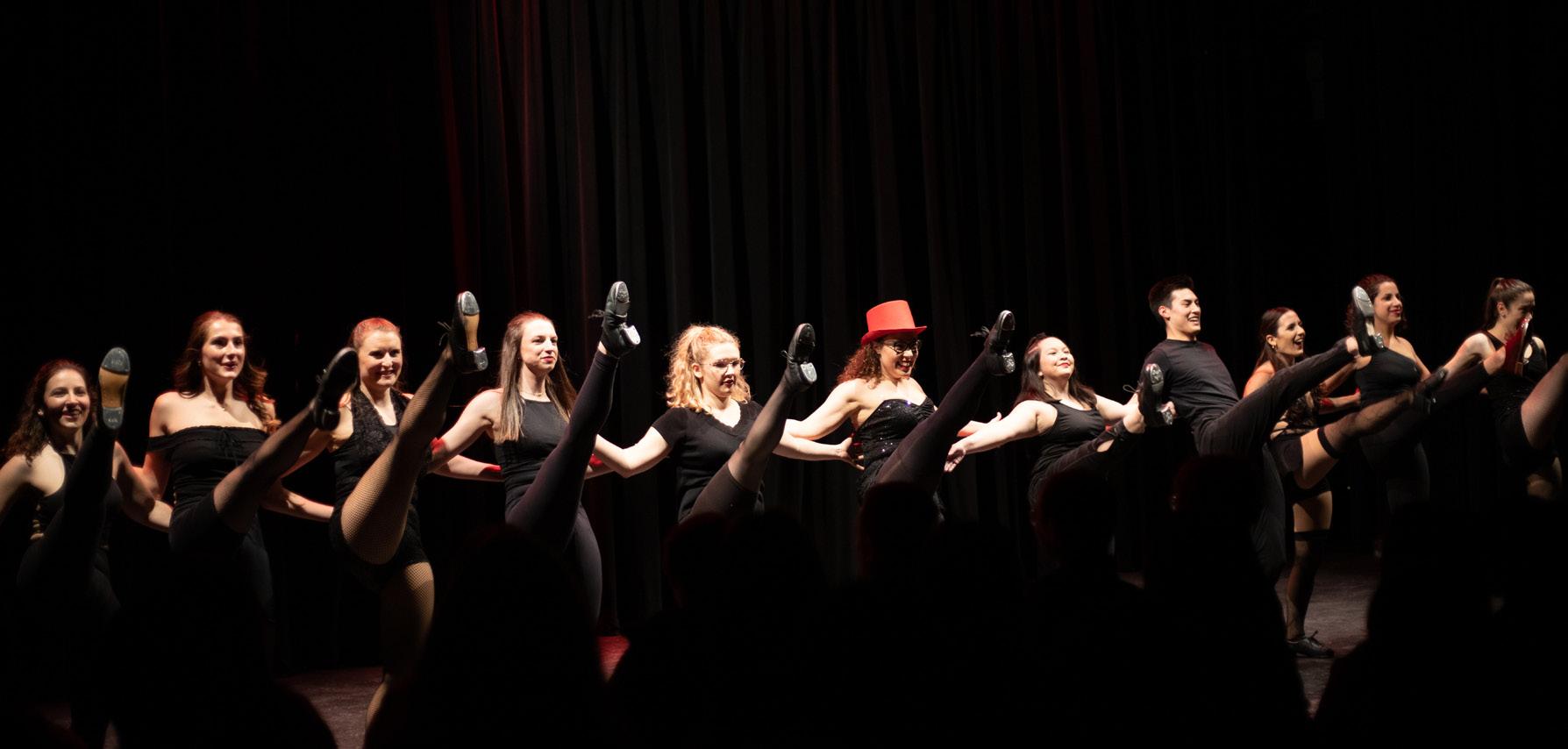
Whether it was due to the intensity of playing No. 4 Syracuse or the spirit of the Red Bandana Game, all the pieces were in place for Boston College lacrosse on Friday night.
In the Eagles’ last game of the regular season, No. 3 BC (14–2, 6–2 Atlantic Coast 6–2) defeated Syracuse 15–13. With the victory, BC moves to 14 wins on the season, one more than its regular season record from the 2021 season.
Friday’s game was a rematch of the 2021 National Championship game, during which BC defeated the Orange 16–10 for its first national title. For BC head coach Acacia Walker-Weinstein, however, past

games were out of her mind on Friday.
“Honestly, we weren’t talking about last year at all,” Walker-Weinstein said. “We put Duke behind us. We put last year behind us.”
The Eagles started the game in control. Charlotte North won the opening draw, and Caitlynn Mossman took the first shot of the game, but Syracuse put the first point on the board.
A few minutes later, however, North capitalized on a free-position shot and tied the game at 1–1. The Eagles outshot Syracuse 9–5 during the first quarter, though the score was tied 4–4 by the end of the first 15 minutes.
Maeve Reilly gives a cocktail tour of Rome, featuring the Negroni and sparkling wine.

Boston College announced that Rev. Michael C. McCarthy, S.J., will serve as the new dean of the School of Theology and Ministry (STM) on Thursday in a University release.

“As someone who has worked at other Jesuit universities, I have long admired the way Boston College integrates academic excellence with human formation,” McCarthy said in an email to The Heights . “So I am very happy to be joining this university community and support that aspect of its culture especially.”

This decision comes after the University announced in late January that Rev. Thomas D. Stegman, S.J., would step down as the dean of the STM amid his battle with glioblastoma. The search for a new dean officially began in February.
McCarthy—who most recently served as the vice president for mission integration and planning and an associate theology professor at Fordham University—will begin his new role on July 1.
McCarthy said he is excited to work with colleagues at the STM who are committed to theological education and ministerial formation, according to the release.
“I am especially grateful to Tom Stegman, for whom I have immense personal respect,” McCarthy said in
the release. “He leaves office with the STM in a terrific place, and I look forward to building on the school’s remarkable success under his leadership. Being asked to succeed Tom in this important work gives me joy.”
At Fordham, McCarthy oversaw Campus Ministry, the Fordham Center on Religion and Culture,
and the Global Outreach program. He also founded Fordham’s Center for Community Engaged Learning—which aims to build bridges between Fordham’s campus and neighboring communities—in 2018 and taught classes within the theology department.
Former President of Ireland Mary Robinson said the climate crisis is in need of a feminist solution during the Hosting Earth Conference at Boston College on Saturday.
“Climate change is a man-made problem and requires a feminist solution,” Robinson said. “It is the way in which we have to address the issues. It’s problem solving and listening to all voices.”
Robinson, who also served as the United Nations Special Envoy for Climate Change from 2014 to 2015, delivered the keynote speech on the climate crisis and ecological hospitality during
the conference, which also included panel discussions and art performances.
When discussing how to address the climate crisis, Robinson said it is important to integrate the stories and perspectives of those who are most affected.
“I came to understand that we weren’t able to grasp the climate story because of the way we were learning,” Robinson said. “We have to move to storytelling.”
Robinson said climate change causes major injustices, especially in the developing world, which is already suffering from generations of poverty and other social issues.
Join the Shea Center for Entrepreneurship for the Strakosch Venture Competition Finals—a live shark tank where student entrepreneurs will pitch their ideas. Doors open at 6:15 p.m. on Monday at 245 Beacon Street, room 107.
5 p.m. in Devlin Hall 008.
The Center for Christian-Jewish Learning welcomes James Carroll to speak about the impact of his book Constantine’s Sword: The Church and the Jews 20 years after its publication. Join Carroll on Monday at 5 p.m. in Stokes Hall S195.
Conference, from A1
“I learned that [climate change] was impacting African countries far more,” Robinson said. “Then I learned that small island states, Indigenous peoples, and the poorest parts of richer countries were also suffering, and they were the least responsible for [the climate crisis].”
As the first female president of Ireland, Robinson, elected in 1990, spoke extensively about gender inequality around the world and how the climate crisis is advancing this inequality.
“Eighty percent of the food in the developing world is produced by women, yet they own much less of the land and get much less access to credit,” Robinson said.
Robinson said her role in the male-dominated world of politics inspired her passion for bringing women leaders together to address the climate
crisis.
Robinson also said her experience as the U.N. Special Envoy for Climate Change helped her recognize the full extent of the climate crisis and its effects.
where participants pledged to reduce their contributions to global warming.
“The interesting thing—which is positive about COP26 despite the fact that the [countries’] pledges are not enough and we’re not on target yet—is that everybody was talking the language of aligning with the 1.5 degrees Celsius, and that’s really important,” Robinson said.
According to Robinson, there is an international goal to limit global warming to 1.5 degrees Celsius.
“[The scientists] made it clear that in that time, bad things will probably happen,” Robinson said. “First of all, the coral reefs will probably disappear entirely. Secondly, the Arctic ice will disappear and the permafrost will melt. Permafrost is very substantial.”
Even with these dire predictions, Robinson said there were significant achievements at COP26—the U.N.’s annual climate change conference
Even a slightly higher temperature, Robinson said, could have serious consequences.
“The most significant step that was taken [to limit global warming] was done because of pressure from climate justice,” Robinson said. “Pressure from the small island states, Indigenous people, and young people who marched in the street in Paris. The mantra was ‘1.5 to stay alive.’”
Robinson concluded her talk by
encouraging people to change how they think about the climate crisis. “Imagine the world we need to be
hurrying towards,” Robinson said. “We have to get a real feeling of wanting to get there.” n

UGBC’s Council for Students with Disabilities (CSD) honored Disability Awareness Week with four events— from rock painting to a student panel—to spotlight disabilities and how they affect the student experience at Boston College.

“It’s very important to bring awareness for all disabilities on a college campus such as this, and this week we’re trying to just bring awareness for all different types of disabilities,” said Catherine Cheevers, a CSD legacy programmer who helped plan this week’s events and MCAS ’23.
The student panel, which was held on Wednesday, featured three student speakers.
Marne Sullivan, MCAS ’23, Conor McCormick, MCAS ’22, and Sarah Farnan, MCAS ’23, shared their experiences as individuals with disabilities at BC.
Sullivan, who was born deaf and underwent cochlear implant surgery as an infant, said she sees her disability as a positive aspect of her life rather than an obstacle.
in high school, she struggled to accept her condition.
At BC, however, Farnan said she embraced her disability as a part of her identity.
“You realize that you kind of have to stand in solidarity with other people and you realize that there are roadblocks for me and there are roadblocks for my friends and other people who I’ve met along the way,” Farnan said. “So, I think just embracing that community and advocating for not only yourself, but also the people around you is a huge thing.”
bit or had to create my own spaces and things like that. But in terms of ‘Do I feel welcome, do I feel included?’ Absolutely.”
McCormick also encouraged BC students with disabilities to take advantage of the wide variety of resources available at BC.
Campus.
The pathway has been in the works for years and members of the CSD are hoping these changes will foster a more inclusive community at BC, McCormick said.
“I realized I wanted to be an advocate through working with CSD and through seeing the physical changes we could make on campus together … and seeing that … there’s power in numbers,” McCormick said. “There’s power when we work together to activate change.”
“I think for disabilities in general, like people tend to focus on the loss or absence of something,” Sullivan said. “I haven’t lost anything by being deaf. I think for me, it’s a new perspective of the world and new, different kinds of living.”
According to Farnan, when she was diagnosed with Crohn’s Disease
McCormick, a member of CSD and UGBC’s chief of staff, said that BC provided him with a safe and welcoming transition to college as a part of the disability community.
Although McCormick said the adjustment was not perfect, he expressed gratitude toward BC.
“Social scenes are kind of limited,” McCormick said. “So, I guess in that way, I felt like I was excluded a little
“Get connected to the disability services offices or Connors Family Learning Center, just as a home base or [as] advocates because they’re always people to look back to if you’re not getting what you need,” McCormick said.
McCormick said the CSD successfully passed a resolution through the Student Assembly last semester calling for a more accessible pathway to Upper
Cheevers said she hopes that Disability Awareness Week and the student panel event help lessen the stigma surrounding disabilities.
“Some of our events are focused on one specific type [of disability], but this [the student panel] was just really about, you know, the stigma of disabilities … and making sure the conversations about it are more comfortable and inclusive.” n
Ukraine and students abroad.
Svitlana Hurkina detailed the devastating impacts of the Russia-Ukraine war, including the death, injury, and abduction of Ukrainian citizens.
“There are 205 children killed, 373 wounded, and about 108,000 abducted to Russia among more than 500,000
Ukranians,” said Hurkina, a professor of church history at the Ukrainian Catholic University (UCU).
Three other panelists joined Hurkina at a webinar on Thursday, titled The View from the Ground: Perspectives from Ukraine, which was organized by the Special Task Force on Ukraine, UGBC, and the Office of Global En-
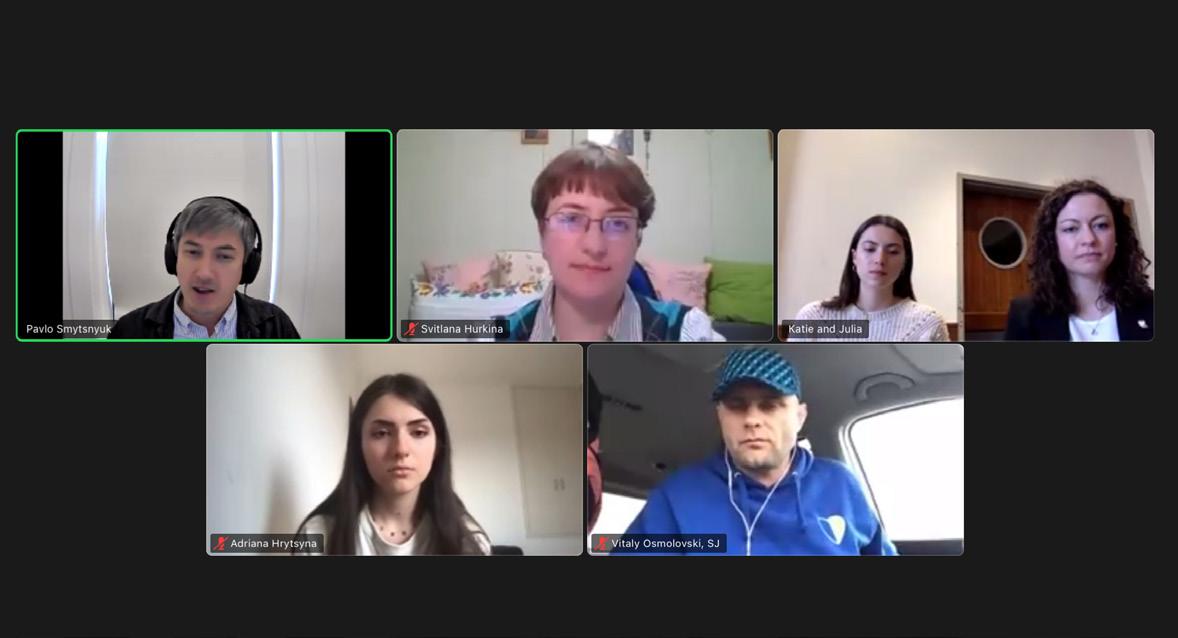
gagement. Julia Spagnola, UGBC vice president–elect and MCAS ’23, and Katie Mahowski Mylroie, a doctoral student at BC, moderated the event.
Pavlo Smytsnyuk, director of UCU’s Institute of Ecumenical Studies, spoke about how he followed the war from New York through contact with his family and colleagues.
“I was in a way following the war as every American—through CNN, Facebook—but also in constant contact with my colleagues at the institute and my family,” Smytsnyuk said.
In his efforts to support Ukraine while in New York, Smytsnyuk said he facilitated meetings between Ukrainian churches and international ecumenical organizations to garner support for Ukrainians, providing necessary resources and transportation out of Ukraine. He also worked with UCU on a project that organized solidarity meetings with students in
“This allows us to, even in the moment of war, be connected … members of one big body that is embracing and loving us,” Smytsnyuk said.
Adriana Hrytsyna, a student at UCU and panel participant, said that before the war Ukraine was divided into two groups—those who believed that Russia would attack and those who didn’t.
“Sometimes people even told me that I was just trying to scare them and that I shouldn’t worry about it at all, because it will never happen,” Hrytsyna said. “But then on the 24th of February … Ukraine was under bombing.”
Vitaly Osmolovski, S.J., a Polish Jesuit of Ukrainian background, spoke about his work coordinating a team of Jesuits to create refugee housing and provide support for other humanitarian organizations.
“The priority of the team is to deliver aid to Ukraine,” Osmolovski said. “We have contact with organizations from other countries which help Ukraine. We have helped several of them to deliver large humanitarian transport to the appropriate places on the border.”
Osmolovski said he and the team continue to work with countries willing to host refugees from Ukraine, helping to transport refugees and provide support along their journeys.
Through this difficult time, Hurkina said she finds comfort in prayer and her faith.
“I pray as a way of connecting to those who are not in safety, and I’m also praying a lot for those people who died,” Hurkina said.
“I haven’t lost anything by being deaf. I think for me, it’s a new perspective on the world and new, different kinds of living.”
“Eighty percent of the food in the developing world is produced by women.”
“There’s power when we work together to activate change.”
The Student Assembly (SA) nominated and confirmed appointees to UGBC’s Executive Council for the 2022–2023 academic year during a Wednesday night meeting.
The representatives unanimously confirmed Deena Mohamed, MCAS ’23, as the chair of the AHANA+ Leadership Council for the upcoming academic year.
“It’s been [several] really long,
difficult years for students of color definitely on this campus, with the numerous bias-related incidents and the lack of administrative response,” Mohamed said. “I want to continue to help students of color in any manner that I can.”
The SA also unanimously confirmed Wells Arkins, MCAS ’23, as the new chair of the GLBTQ+ Leadership Council (GLC). In this role, Atkins said he hopes to increase intersectional and social programming as well as advocacy for students
in the LGBTQ+ community.
“I’m sure many of you have participated in GLC social programming events like formal and Born This Way Cafe coming up on Friday,” Atkins said. “These reach the most students out of any of the events we do, and they’re really integral in forming an LGBTQ+ community on campus, so increasing both the number and the accessibility of these events is super integral to GLC programming.”
Sarah Farnan, who was unanimously confirmed as the next chair of the Council for Students with Disabilities, said she hopes to increase campus accessibility and enhance disability education for students.
“I also want to work on some curriculum changes,” Farnan, MCAS ’23, said. “So meeting with the faculty again to discuss accessibility, compiling a guide for faculty … and [creating] an online reporting forum for students when professors violate protections that are afforded to them through [Americans With Disabilities Act] rules.”
As the new director of financial
affairs, Andy Bonilla, CSOM ’23, said transparency is one of his goals.
“I envision having mandatory weekly or bi-weekly meetings with liaisons from every division within UGBC to make sure everyone is up to date with myself and their respective clubs so that we make sure the budget really is in good hands,” Bonilla said.
After several SA representatives asked Bonilla questions about his plans if elected, Gianna Russi, current vice president of UGBC and MCAS ’22, motioned to vote. But one representative objected, suggesting all further nominations be decided by a roll call vote, rather than a unanimous voting system. Bonilla was then confirmed, with only a few representatives abstaining from the vote.
Caitlin Martin-Welp, MCAS ’23, said she hopes to foster increased connection among UGBC’s various divisions as next year’s director of communications. Martin-Welp was elected by a 20–1 vote.

“In addition to social media,
which I always think is a great way to promote and engage with the student body, I’d love to also increase faceto-face connections,” Martin-Welp said.
The SA also unanimously confirmed Meghan Heckelman, LSEHD ’25, as the next director of student initiatives. Heckelman described her plans to start a freshman leadership training initiative for UGBC members to improve relations and resolve separation among the organization’s divisions.
“I think that what we’re supposed to be doing is listening to student needs and wants and doing everything that we can to put out programming that fills those needs and wants,” Heckelman said.
To conclude the meeting, the SA confirmed Giovanna Eichner, MCAS ’23, as the next director of the environmental and sustainability division.
Read the rest of this story at www.bcheights.com
Boston College’s expansive networking reach—including events like Green Careers Night— can help students passionate about the environment kick start their careers, according to Kayla Pelland, assistant director of career education at Boston College.
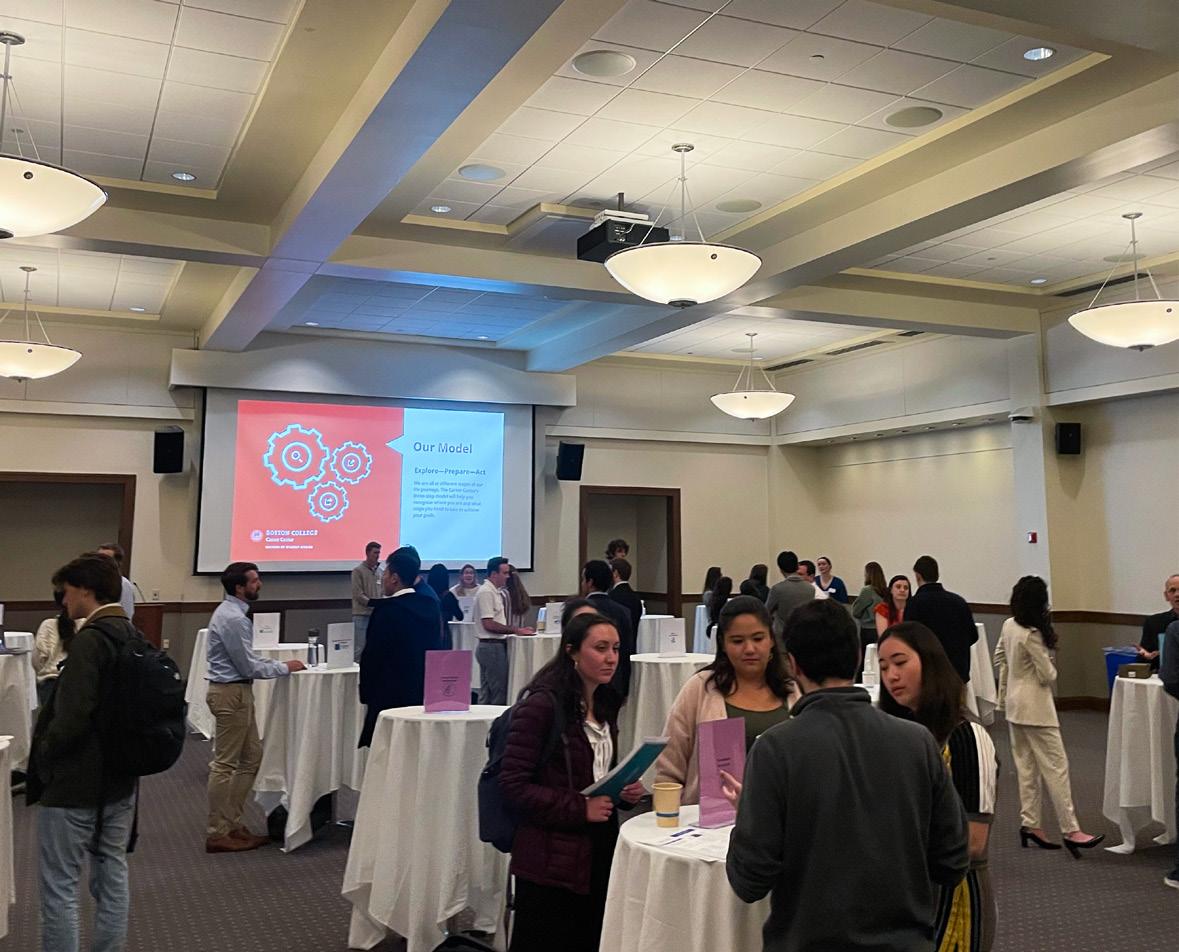
“[Green Careers Night] is really meant to provide students with a networking opportunity with alumni and employers, and it’s especially for students who are interested in a variety of sustainable and environmental careers,” Pelland said.
This Wednesday the Career Center teamed up with BC’s environmental studies program, the Office of Sustainability, the Energy and Environment Alumni Network, EcoPledge, and UGBC’s Division of Environmental Sustainability to host Green Careers Night, an event where students can hear from alumni working in sustainabilitybased careers.
Giovanna Eichner, UGBC Environmental Sustainability Division member and MCAS ’23, said the event also encourages students with non-environmental career focuses to consider how they can include sustainability efforts into any profession.
“You have a lot of different people from a lot of different industries here, and it encourages people who don’t usually do environmental things that [are] maybe interested in different industries to come and see how they can contribute to environmental commitment,” Eichner said.
Sari Kayyali, microgrid manager for GreenRoots and an event speaker, said she is currently working on a project to install solar batteries in low income housing and municipal buildings in Chelsea, Mass.
“Traditionally, people who have benefited from solar savings are the people with the money to invest in it,” Kayyali said. “The medium income of solar adopters is over $100,000, so we’re trying to bring some of those savings to people who haven’t traditionally seen them.”
Robert Durning, executive vice president of GreenerU, explained how the company aims to help organizations reach climate neutrality through various services. “We deliver planning, engineering, and implementation services for the organizations that we work for,” Durning said. “We’ve got teams of planning consultants who work with the organization to pull together what an organization’s climate neutrality path should look
like and benchmark where they are today and set goals for where they should be in the future.”
According to Durning, GreenerU also has a team of engineers who aim to help universities reach climate neutrality through energy efficiency and electrification. The clean energy solutions are then delivered to the company’s clients.
Caitlin Connelly, BC ’19, spoke about her involvement with Wood Mackenzie Power and Renewables, a global research and consultancy business that provides data and analytics used to support the renewable energy industry to organizations and governments.
“Fifty percent [of my day] would be research of markets, tracking policies, seeing what’s going on in the market, and talking to different solar installers and different companies about what they’re seeing in the market,” Connelly said. “The other 50 percent is taking all that data and insight, processing it, and then writing reports.”
According to Connelly, many of Wood Mackenzie Power and Renewables’ clients are banks, oil and gas companies, and utilities that want to be in the know of current solar market data and forecasted solar market data.
Christine Smith, BC ’85
and BC Law ’88, said she wanted to find ways to help protect farmlands through her career. Smith now works as an attorney for the Department of Agricultural Resources in Massachusetts, a government department focused on promoting and protecting food sources in Massachusetts.
“If someone has a big farm, they could sell it to a developer to make a lot of money, and then the farmland is gone in a good source for the Commonwealth,” she said. “So we have a program whereby we can apply those same development rights and pay [the farmers] so that
they still own the land, but there’s a restriction placed on the land so it always has to be used for agriculture forever.”
Elise Dickinson, an event attendee and MCAS ’24, said she went to the event because of her interest in sustainability as an international studies major.
“I thought [this event would be] a great way for me to get a view of some of the different things that BC alumni have done after college relating to sustainability and business and their careers,” she said. “So it was really just a great learning experience for me.” n
STM, from A1
“A distinguished theologian and teaching scholar and experienced university administrator, Fr. McCarthy brings more than 30 years of academic, administrative, and ministerial experience to his new position,” the release reads.
Beyond his time at Fordham, McCarthy worked at Santa Clara
University as the executive director of the Ignatian Center for Jesuit Education and assistant to the president for mission and identity.

He has also worked at Loyola University Chicago and the University of San Francisco.
McCarthy earned his bachelor’s degree from Santa Clara, his master’s from Oxford University, his master of divinity from the Je -
suit School of Theology at Berkeley, and his doctorate from the University of Notre Dame.
According to the release, his main academic interests include Jesuit higher education in the United States and historical theology surrounding early Christianity, religious belief, and Augustine.
“As a Jesuit, there are few things I can imagine more important for
the Church or the work of the Society of Jesus than developing the next generation of leaders,” McCarthy said in the release. “So I approach my service as dean with my whole heart and with trust in God. My first order of business will be to listen and to learn.”
In the release, Provost and Dean of Faculties David Quigley said McCarthy’s career and expe -
rience with other Jesuit universities prepared him well to lead the STM.
“I am excited to welcome him to campus this summer and to build on Dean Stegman’s remarkable legacy,” Quigley said. “Mick is committed to extending STM’s reach in service of the local, national, and global Catholic Church.” n
Jackalyn Schrader, a West Newton resident, was alone in her backyard shed when she first heard gunshots coming from her neighbor’s air rifle.
“I had no phone. I had no way to call 911. I didn’t know if it was gone,” Schrader said. “I ran back into the shed. I could not tell where the shots were coming from. I couldn’t tell directionally, and I didn’t know what the heck was going on. I had no idea—I was terrified.”
West Newton residents reported that neighbor Bruce McKee built a shooting range in his backyard and sometimes misfires his air rifle toward surrounding properties, as WBZ first reported on April 1.
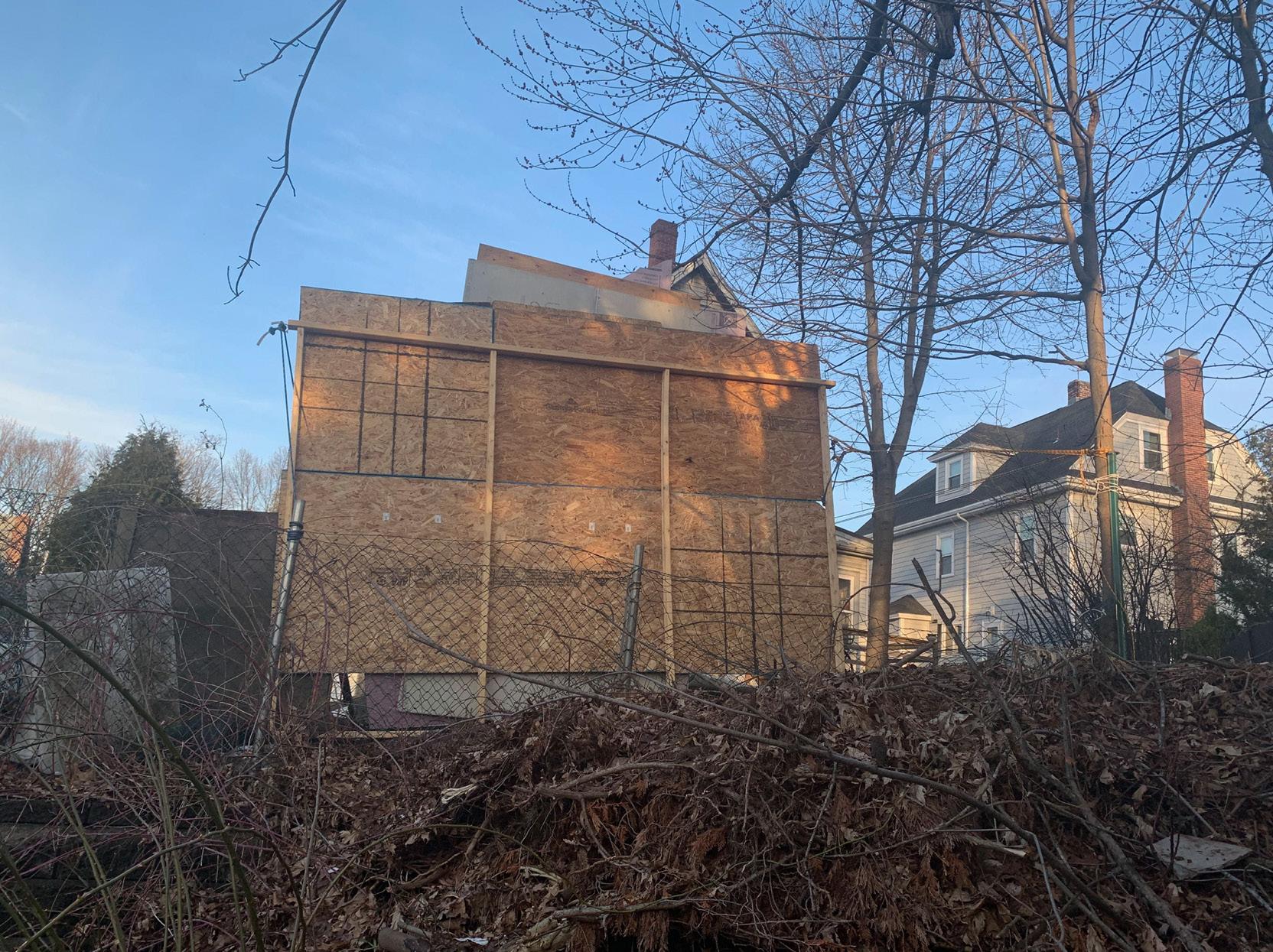

Because current city ordinances do not classify McKee’s actions as grounds for an arrest, many residents have been in communication with Mayor Ruthanne Fuller’s office and the Newton City Council to try to change the ordinances.
The city council spoke about the air rifle ordinances at an April 4 meeting. McKee’s neighbors did not know what to expect from the meeting but were hopeful, according to Schrader. She compiled all of the pictures she took of alleged pellet holes in her fence into a powerpoint presentation and emailed it to the city council the day of the meeting, which she said captivated the attention of the councilors.
“The first thing [the councilors] said in the meeting was ‘If you guys have not looked at your email, you guys need to do it before this comes up on the agenda tonight,’” Schrader said. “They couldn’t believe what they were seeing in the pictures that I had submitted.”
Schrader said the city councilors had already spoken to their legal team prior to the city council meeting in order to understand how they could amend the ordinances.
Air rifles—non-powder discharge weapons—are not classified as firearms in Newton’s current ordinances and therefore cannot be regulated as guns are. Under Massachusetts state law, it’s illegal to discharge a firearm, rifle, or shotgun within 500 feet of a residence without the building owner or legal occupant’s consent. But no such law exists for air rifles, although it is illegal in Massachusetts to shoot an air rifle in or across any public streetway.
To address the issue, the city council brought Newton Police Chief John Carmichael forward at the meeting to speak to the risks of air rifles and how other Massachusetts municipalities regulate them.
Municipalities such as Medford, Peabody, Winthrop, and Somerville prohibit the discharge of any air gun within city limits with limited exceptions, according to Carmichael.
“Currently, federal law does not consider or regulate non-powder
fire guns as firearms,” Carmichael said. “Recognizing that non-powder guns are dangerous, many municipalities post further restrictions on air guns.”
Ward 3 Councilor-at-Large Andrea Kelly said she and the other councilors hope to amend current ordinances to classify non-powder weapons as firearms.
Carmichael said he hopes to increase fines for breaking the ordinances to $300 per violation and increase the fine as the amount of violations increase. The city council pushed the motion to a future docket at a future date.
Prior to the April 4 meeting, Schrader called the police in March after she said the neighbor shot through her back fence with his air rifle. Three police officers came to her house, but they concluded that the situation was out of their hands, she said.
“We started to begin to fear for our safety because there was a hole that was shot,” Schrader said. “The
police tell me that I don’t have the pellet to prove that it was what punctured the fence. We can’t unequivocally prove it, but I know in my heart and soul that it was one of the shots from his air rifle.”
Unable to resolve the conflict with the police, Schrader signed a letter written by Timothy Techler, another Newton resident, addressed to Fuller’s office explaining the situation and asking for the city to act against McKee.
As McKee’s air rifle shooting continued, Techler urged all the neighbors to reach out to the Newton City Council, and Schrader’s husband, John Piselli, decided to write and send an email.
“John actually sent to every city councilor in Newton with his plea and with a copy of the police report that detailed the type of air gun it is [and] the specifics about that air gun—that it can kill a person [and] that it can kill a deer,” Schrader said. “So, the councilors heard us, and they created a docket number
for us.”
The police have advised all the neighbors not to engage with McKee. McKee told WBZ that shooting the guns is a form of relaxation for him.
According to Schrader, the shooting causes anxiety for others.
“All I can think to myself is this is creating anxiety for all of your neighbors, but it’s calming for you,” said Schrader. “Why would you put somebody in an anxious or stressful situation like that if you’re using this to calm yourself and you’re doing nothing but raising our fears? That makes no sense.”
Kelly said at the meeting that she hopes the city council will work with McKee’s neighbors to fully amend the city’s ordinances and prevent any further damage.
“There’s no need to wait for a tragedy before taking action,” she said.
McKee did not respond to two phone calls and an email from The Heights for comment. n
Newton Mayor Ruthanne Fuller presented the proposal of Newton’s fiscal year 2023 budget—which expands the city’s spending on schools and municipality departments—to the Newton City Council on Tuesday.
The $480 million operating budget— spanning from July 1, 2022 to June 30, 2023—increased by $17.3 million from the previous fiscal year. Its major components include $262 million allocated to Newton Public Schools, $61 million to water, sewer, and stormwater enterprise funding, and $5.6 million to community preservation funds.
Fuller presented the budget to the City Council on Zoom after testing positive for COVID-19, while some councilors
attended the meeting in person at Newton City Hall.
Fuller said that the COVID-19 pandemic continues to hinder the city’s revenue, manifesting in both modest increases in federal and state funding and lower tax revenues compared to pre-pandemic levels.
Her administration wrote in a written analysis of the budget that the effects of the pandemic will have less of an impact on the city’s revenue in coming years.
Fuller said her administration also took initiatives to increase funding for the budget following the pandemic, such as employing city workers for yard waste collection instead of outsourcing the work.
Fuller said that the city will use $3 million of its American Rescue Plan Act (ARPA) funds to increase its $480 million operational budget. Fuller also
announced that the city will allocate an additional $2 million in ARPA funds to support residents facing hardships due to the COVID-19 pandemic.
The city has committed about $32 million out of its $63.2 million of available ARPA funding. Fuller has also said that despite the city’s reduced revenue sources following the pandemic, it must taper its use of ARPA money.
“Otherwise, Newton would face a dangerous financial cliff of our own making,” Fuller said. “Additionally, we are prudently holding some ARPA funds in reserve in case we experience another nasty turn from the virus and, with it, the need to make additional investments.”
The city’s FY2023 budget will follow a similar principle of prudence, according to Fuller.
“Despite a 3.5 percent increase for
the Newton Public Schools budget and a 3.0 percent increase for the municipal departments, we still had to make difficult choices this year,” she said. “This budget balances our ambitions for Newton with our fiscal reality. Pragmatism must con-
tinue to guide us as we navigate complex economic trends.”
The City Council will deliberate on the budget in the upcoming weeks and will vote on it in late May, according to a calendar on the city’s website. n
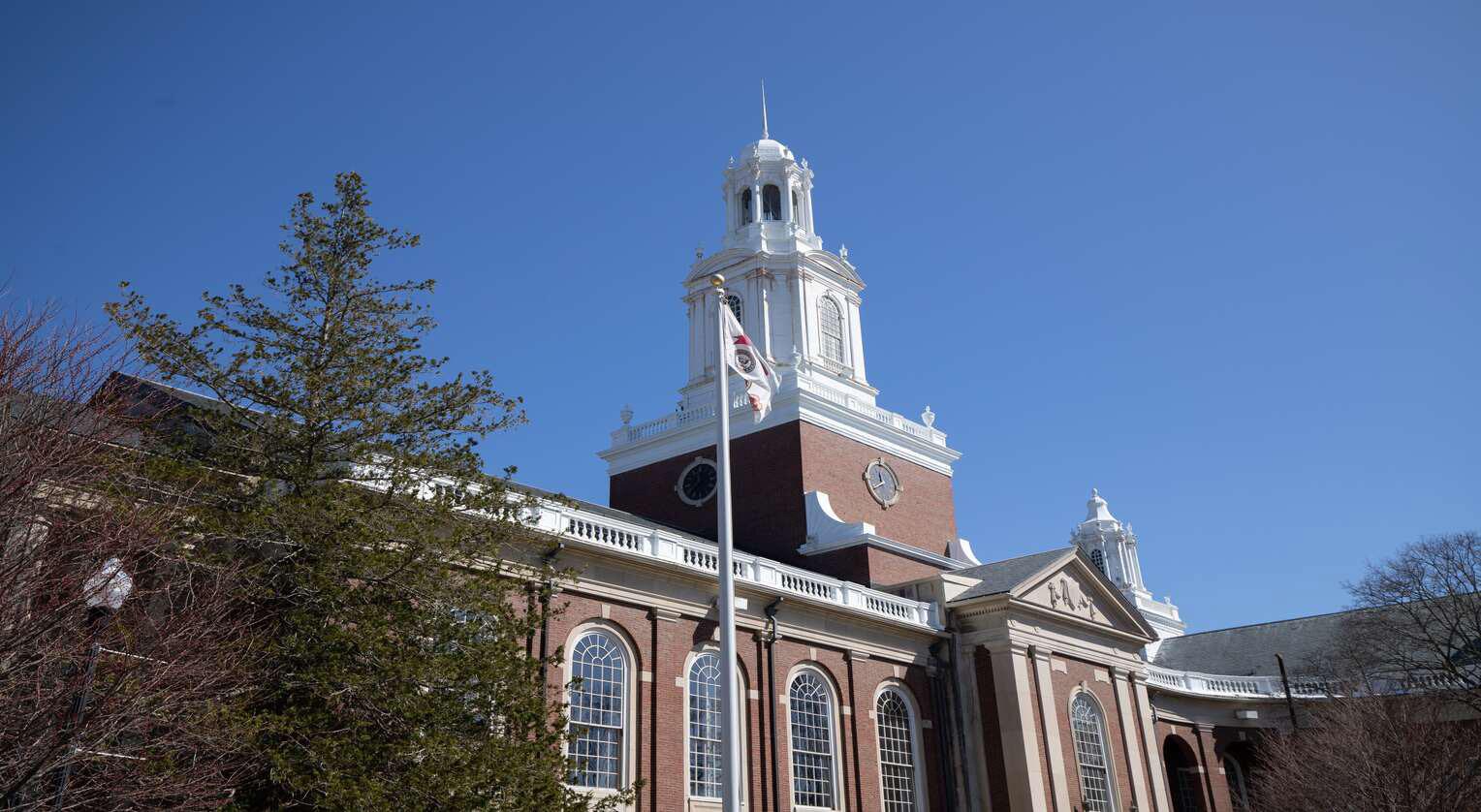 COURTESY OF JACKALYN SCHRADER
COURTESY OF JACKALYN SCHRADER
Bruce McKee built an air rifle range in his West Newton backyard.
STEVE MOONEY / HEIGHTS EDITOR
COURTESY OF JACKALYN SCHRADER
COURTESY OF JACKALYN SCHRADER
Bruce McKee built an air rifle range in his West Newton backyard.
STEVE MOONEY / HEIGHTS EDITOR
In light of this trip, the column will look a little different this week. While I debated making a cocktail in my small Airbnb apartment, I decided instead to document a few of the drinks I had while there.
I will always rate a Negroni a 10 out of 10—to me, it is the perfect cocktail. But maybe that’s just because I’m a big gin enthusiast.
Check out this recipe if you’re interested in making one. And remember, stir, don’t shake.
Yes, limoncello tastes good and is a yummy way to end off a meal, but the act of sipping on limoncello with a group of friends is half the fun.
Final paper due in a week? It’ll be left to the last minute. Group project looming on the horizon? The group chat hasn’t even been made yet. Test that counts for 30 percent of your final grade tomorrow? Cramming starts in an hour. So is the mindset of a second-semester senior.
It seems senioritis has visited each and every Eagle who soon plans to leave campus and embark into “the real world.”
In the past few months, I have fallen prey to this unfortunate mindset.
And it’s this exact mindset that prompted me to buy a round trip ticket to Rome, Italy and take a week off of classes … that I very much should have been in.
In all honesty, though, I had planned the trip far in advance and taken steps to make sure I was up to speed on my work and had notes sent to me by my classmates.
So, on April 6, I boarded a plane to Portugal, survived a layover in Lisbon, and landed in Rome to visit a friend who is studying abroad.

My first night in Rome, my two friends and I leisurely walked the streets and saw landmarks like the Pantheon and the Trevi Fountain.
The beautiful thing about eating in Italy is that you have an infinite number of restaurants to choose from, most of them boasting low prices for authentic
My heart sang as I ate carbonara for eight euros and drank house wine that was six
Before every meal, we usually had an aperitif, and I always went with the Negroni.
I started off this first meal with one that was better than any I had had in the states.
Negronis are one of my favorite cocktails. Made out of gin, sweet vermouth, and Campari, every ingredient is alcohol, so this drink packs a punch.
If you have a few sips on an empty stomach as you’re waiting for your small plates to come out, you’ll find yourself a little tipsy by the time a plate piled high with pasta arrives.
The natural wine fanbase has grown over the past couple of years and for a good reason. It’s a lighter taste and usually has a lower alcohol content, making it a super enjoyable drink to have during a picnic or with an early dinner.
My friend took us to a small natural wine bar near his dorm in Trastevere, Rome. We chatted with the owner for a bit, and he told us about his aspirations to open a natural wine bar in SoHo, Manhattan.
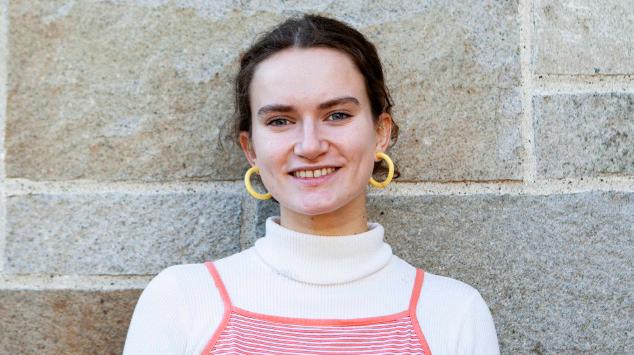
The wine bar certainly felt like it was plucked out of downtown New York, with its cool interior and mirror-lined bar.
I have tried natural wine before and thought it tasted more like an intense cider than a glass of wine. Canlibero’s V for Vittorio from Campania, Italy, though, was a much different glass than I had had before.
At 12.5 percent, it was just as alcoholic as a regular bottle of wine, but it still had that light and fresh taste that natural wine has, setting it apart from a normal bottle of wine. This wine was seven out of 10.
I won’t say much about this digestif. If you know, you know.
meals, we’d order a round of limoncello shots. Bigger than the average 1.5 ounce shot you might find in a bar, this afterdinner delight is meant to be sipped, as digestifs help with digestion after a meal.
evidence on that front, but I can say that a limoncello shot will always get a solid six out of 10 from me, taste and experience wise.
you know. The first time I tried a baby Guinness shot was in Ireland last summer. My cousins and I were having a few drinks at the bar in the hotel we were staying in and ended off the night with a round of baby Guiness shots.
It’s a simple shot—2 ounces of coffee liquor with half an ounce of Irish cream liquor floated on top—but it is one of the most delicious in the game.
Though it doesn’t have any Guinness in it, the shot gets its name from the fact that it looks like the baby version of the popular Irish beer.
I bonded with other college students abroad in a popular bar at night over baby Guinness shots as we took turns buying each other rounds.
I give a 10 out of 10 for this adorable concoction. If you’re looking to make it for your roommates this weekend, check out this recipe.
sparkling bottle has a
I like all sparkling wines, and I’m always looking for little things that set a certain bottle apart from the rest, just like this bottle of Monsupello Metodo Classico. It is a solid seven out of 10.

My trip to Rome was defined by taking in the world-famous ruins, eating more pasta than a human should in a year, and indulging in delicious cocktails and wine.
Is my bank account completely done for? Yes. Would I do it all again in a heartbeat? Absolutely. If you’re looking for a slight taste of Italy, or Europe for that matter, give any of these drinks a shot this weekend.
Pho Viet’s II is open for delivery and pickup from 11:00 a.m. to 7:30 p.m. Sunday through Thursday and 11:00 a.m. to 7:45 p.m. Fridays and Saturdays. The restaurant currently does not offer dine-in options.
Customers and delivery drivers shuffled in and out as the staff was busy answering phone calls and fulfilling orders, but it’s all in a day’s work at Pho Viet’s II, a family-owned restaurant that has been serving award-winning Vietnamese food to Newtonians for three years.
Kelly Tran, the restaurant’s owner, is a third-generation restaurateur.
Tran said the family tradition started with her grandmother, who moved to America from Vietnam and worked as a chef in Boston’s Chinatown before opening her own restaurant.
Pho Viet’s II opened after the success of the original location, Pho Viet’s. The original, located at the Super 88 Food Court in Allston, has been a Boston staple since 2006. Multiple generations of Tran’s
family have run both locations since their inception.
Tran said the food at Pho Viet’s II reminds her of her family and its importance.
Bánh mì, beef and chicken plates, and pho—a noodle dish for which the restaurant is named—are among the most popular items on the menu, according to Tran.
The grilled lemongrass chicken breast with rice is popular among younger patrons.
The lemongrass chicken comes in a big portion, as do most items at Pho Viet’s. The deliciously spiced chicken lies on a bed of sticky rice with a side of vegetables that can be mixed into the rice.
Diners can also order the lemongrass beef, which comes with a similar assortment of ingredients. The restaurant serves the dish with fish sauce and chili sauce.
Tran said she recommends adding the fish sauce to the rice but not pouring it over the chicken, as it already has ample spices.
Those who like a little more spice in their food can add a dash of chili to their fish sauce.
Adem, a 27-year-old who works
in Newton, said he loves stopping by Pho Viet’s II after work to pick up a sandwich.

“The Vietnamese sandwiches are great,” he said. “It’s basically the same price as a Philly cheesesteak or a roast beef these days, but you can’t compare the two. This is so much better—you know what I mean? It’s different.”
The restaurant had a capacity of 30 before the onset of the COVID-19 pandemic.
Now, it offers take-out and delivery only, as its centrally placed, open kitchen makes it difficult to accommodate indoor dining during the pandemic.
Despite the change to delivery and take-out only, Tran said the restaurant welcomed more patrons since the pandemic hit than it did prior.
“Our business has actually increased since doing delivery and takeout only,” Tran said. “We are very popular with students and families, especially in the evening. We always get bigger orders then.”
Newton resident Jennifer Nguyen said she went to the restaurant to pick up orders for her family.
For
“Oh
with bags full of carry-out containers in her hand. n
“I don’t know how I’m gonna get this to the car,” Nguyen said with a laugh, referring to the multiple bags of takeout she was carrying.
Nguyen said that her mom likes the thick noodle soup with seafood.
herself, she ordered the currytofu sauté, which she was trying out for the first time.
my god—I would totally recommend this place.” Nguyen said before rushing to her car
Well, Class of 2025, our time as freshmen is quickly coming to a close. Freshman year can be difficult in many ways, but there’s an element of nostalgia in saying goodbye to our first year at Boston College.

With just around one month left until the end of the semester, you might be wondering about how to make the most out of the short time we have before summer vacation. Here are some of my tips on how to finish the semester strong and a few ways to make the most of the remaining time on campus.
While it is tempting to brush off your responsi bilities as summer approaches, make sure to attend all of your classes and
complete all of your schoolwork.
The last month can be a good opportunity to befriend your fa vorite professors, which will ulti mately be beneficial for you— you can stop by their office hours for meaningful conversations about the class or for extra final exam prep.
You won’t regret pushing through to the the semester—it’ll all be worth it in the end.
Deep Clean Your Room Before You Move Out
Now is the perfect time to organize your closet and clean up that space under your bed that you have been procrastinating doing for the entire
semester. Give yourself time after class or over the weekend to clean

ing or looking back at your camera roll, reflecting on your first year at BC is a nice way to remember your best moments and experiences. Freshman year can be hard, but through reflection and remembering the best moments, you can end the semester on a positive note. A great way is to also create a collection of your favorite photos from freshman year and get them printed
yourself is important, but so is going out and meeting new people— you never know the new relationships you could build just from one night out. You can also make more unforgettable memories with your friends by exploring new places in Boston together, ultimately expanding your options for the next school year.
self early for sophomore year. In addition to preparing for your chosen classes for next semester, get a head start on looking into more ways you can get involved on campus.
This includes searching for clubs and student-run organi zations you might possibly want to join once the new school year starts again. Just because we’ll be sophomores doesn’t mean we can’t get involved again!
Reflect
Whether it is through journal -

think of your best times at BC while at home during the summer.
Work Hard, Play Hard Staying in and having time to
Regardless of how you spend the remaining weeks of freshman year, the most important thing is to be proud of all the work you have accomplished—we have all pushed through different challenges and adjusted to a new environment.
Freshman year might have been the best for some people, but also the worst for others. If it wasn’t the greatest, sophomore year can serve as a fresh start.
I hope these tips help you maximize your last few weeks on the heights and help you reset before going home for the summer. n
When real estate attorney Taisha Sturdivant advises clients on affordable housing cases, she brings a unique perspective and is well aware of the importance of stable housing on an individual and a community’s well-being.
After losing her mother at a young age, Sturdivant, BC Law ’16, said she was orphaned as a child and bounced from house to house, growing up in dangerous sections of Dorchester and Roxbury. Familiar with the experiences of the communities served by affordable housing, Sturdivant said she connects with neighborhood leaders trying to preserve affordable housing on a personal level. Sturdivant was recently named a Massachusetts Real Estate Rising Star.
“In representing local community development corporations, I am often working alongside people who have had similar experiences to me, who have the same passions as me, and who often look like me,” Sturdivant said. “I think that there is a certain level of mutual respect that we have … to say we know that we have shared the same passions and that we are doing this work for the right reasons.”
And when advising clients on certain issues, Sturdivant’s experiences help her advocate for housing residents whose needs might otherwise be overlooked, she said.
“The lens that I have in terms of my own relatives needing to be relocated and some of their experiences, both negative and positive, has informed the way that I’m able to advise my clients,” Sturdivant said.
From time to time, Sturdivant said developers will have to briefly relocate their residents in order to refurbish existing housing. But Sturdivant de-
scribes the legal protections afforded to relocated residents as “bare-bones.”

To improve the conditions of relocated residents, Sturdivant said she often suggests that her developer clients consider the length and distance of relocations as well as the resources that developers can provide tenants with to ease their relocations.
After receiving her undergraduate degree in urban education in 2011 from
loved my property law class way more than I thought that I ever would,” Sturdivant said. “It was my favorite course, and I was like, ‘Oh, that’s kind of shocking.’”
Sturdivant said she greatly enjoyed her property law class that ultimately planted the seed that grew into her eventual career. Taking that class inspired her to consider her experiences growing up in affordable housing when
At one point, Sturdivant said she defended a tenant facing eviction from a triple-decker home owned by a moderate-income landlord who relied on the rental income to pay the mortgage.
“I was fighting for a client, rightfully so, to stay in the housing, but also understanding that the longer they stayed in there not paying their rent on time, the more it was going to impact this gentleman who was just staying afloat,”
able. During the internship, Sturdivant worked on large projects which she said was gratifying.
After graduating from BC Law, Sturdivant launched her career at a private law firm specializing in affordable housing. From a connection she made at Preservation of Affordable Housing, Sturdivant found her first job after law school at Klein Hornig LLP, representing nonprofit developers and community development corporations in the Boston area.
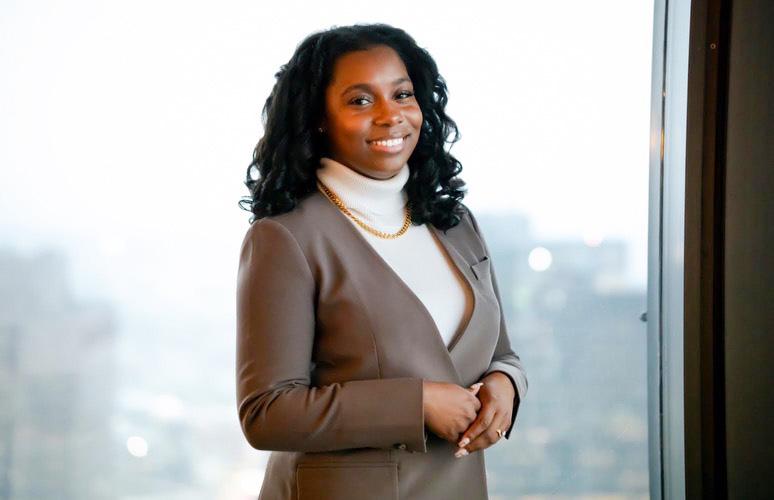
Sturdivant said she finds it invigorating to see her legal work manifested in brick and mortar, getting to walk around the neighborhood and see projects that she worked on—including Newcastle Saranac Apartments in the South End, a transaction which she said was particularly complex.
Sturdivant represented the Fenway Community Development Corporation’s purchase of the apartment complex, which saved the affordable housing from being converted into expensive market units.
Sturdivant said that affordable housing deals are particularly complex because they draw from so many different sources of funding—unlike commercial deals where one lender might finance the entire project.
Brandeis University in Waltham, Sturdivant enrolled at BC Law. Sturdivant said she initially expected she might become a criminal defense attorney or pursue a career related to litigation after completing internships during high school and college at the U.S. District Court for the District of Massachusetts. Once she began taking law classes, however, she said her prospects changed.
“In my first year of law school, I
choosing her area of practice.
The summer after her first year of law school, Sturdivant interned at the AIDS Action Committee of Massachusetts, performing legal work on behalf of clients diagnosed with HIV and AIDS. Sturdivant said she primarily helped with landlord-tenant housing disputes, but while the work was important, it felt too narrowly focused and insufficient to counteract the broader housing crisis, she said.
Sturdivant said. “Something about it just felt too micro. It felt too much like triage.”
Hoping to find work in the affordable housing field on a larger scale, Sturdivant interned at the nonprofit organization Preservation of Affordable Housing the following summer. She said the organization identifies affordable housing in danger of being converted to market-rate rents and purchases the units to keep them afford-
“Having lived in the South End before, in affordable housing, I know how important it is to be in that kind of neighborhood where you have access to the T, Northeastern right next door, really good restaurants, and you’re just a jump from downtown,” Sturdivant said. “So it’s prime real estate, and I’m really glad that we were able to preserve the housing there.”

Family, friends, students, and alumni packed the Bonn Studio Theater in buzzing anticipation of Boston College On Tap’s inaugural solo showcase, entitled Body And Sound

The dancers—including freshmen, sophomores, juniors, seniors, and a graduate student—flexed their dancing muscles with a variety of show-stopping numbers choreographed to a range of music styles.

Friday night’s show opened with “Come Together” by Gary Clark Jr.
and Junkie XL. The bumping rock beat of the song complemented the dancers’ driving tap steps.
The sound of dozens of tap shoes hitting the floor in unison produced an intense wall of sound and made for a rousing start to the night.
The second dance of the show starred five BC On Tap rookies. These new members of the team showed off their impressive skills to the tune of “Sunday Morning” by Maroon 5.
The third dance, choreographed to “Kiwi” by Harry Styles, also showcased the force of BC On Tap with a section of the performance done without music, highlighting the rhythms that the dancers created themselves.
The incredible sounds of intricate tap steps once again filled the theater, bringing a powerful end to this dance.
After a guest performance by BC Irish Dance, On Tap dancers once again took to the stage to perform a dance with heeled shoes, introducing this new style to the group’s rep -
ertoire. Wearing stilettos instead of tap shoes, the dancers, framed in intimidating red lights, delivered a new form of performance called heels dance.
After a guest performance by the BC Acoustics a cappella group, the tap dancers came back on stage to the groovy beat of “Beggin” by Madcon.
The music complemented the syncopated rhythm of the tap steps, and each dancer got a short solo and showed off a tap step or two.
Another highlight of the night came when BC On Tap alumni got a chance to perform a number from their four years as tappers in the group at BC.
Performing their 2017 Showdown number called Chicago , they tapped with energy to the lively songs of the famous musical by the same title.
The alumni performed with zest, showing that they were excited to be back sharing their passion for tap dance.
The showcase came to a close
Featuring
After
BC On Tap struck one final stage pose, marking a triumphant end to its first showcase.
The stage was bathed in a golden light as dancers swayed in unison and often landed with their feet planted firmly on the ground, arms uplifted to the ceiling. At Capital Dance Ministry’s debut showcase, titled Genesis, on Friday night, smiling dancers celebrated their Christian faith through a variety of large group and partner dances.
The audience packed into the crowded Murray Function Room to cheer on the recently founded club’s first performance. Co-presidents Jason Tee, MCAS ’22, and Kevin Joo, MCAS ’23, welcomed the crowd and outlined the format of the night’s showcase and the meaning behind the group’s performance.The members use the gifts of dance, known as body worship, to celebrate their love for Christ, Tee said.
Tee shared the history of the dance group, which he founded in the fall of 2020 with Chaeyoon Syin, LSEHD ’23. The Office of Student Involvement
approved the group, known as Cap amongst its members, this fall.
“It started as just an idea in Chaeyoon’s mind about bringing a dance team where we can glorify God at BC,” Tee said. “And I’m so excited that we are here standing on this stage today bringing together exactly what that vision was.”
After Joo led the audience in an opening prayer, dancers took their places onstage and kicked off the night with a routine choreographed to “Hold On Me” by Travis Greene. The room was aglow with bright lights, as twinkling lights hung on the wall and warm, yellow spotlights shone on the dancers.
Before the large group performances, a video of the choreographers played and explained the meaning behind each dance. Throughout the event, individual members of the group also stepped onstage to give testimonials in which they shared how God has influenced their lives.
Vanessa Yu, LSEHD ’24, delivered the first testimonial and talked about
how, after attending her first Cap practice, she was inspired by the energy and encouragement of all the group members.
A pair of dancers took the stage along with the sound of the heavy bass beat of “Wild (Hotel Sessions)” by Local Sound. The dancers showed off their tight hip hop moves. In the final moments, they turned toward the back of the stage and posed with their hands pointing to the ceiling.
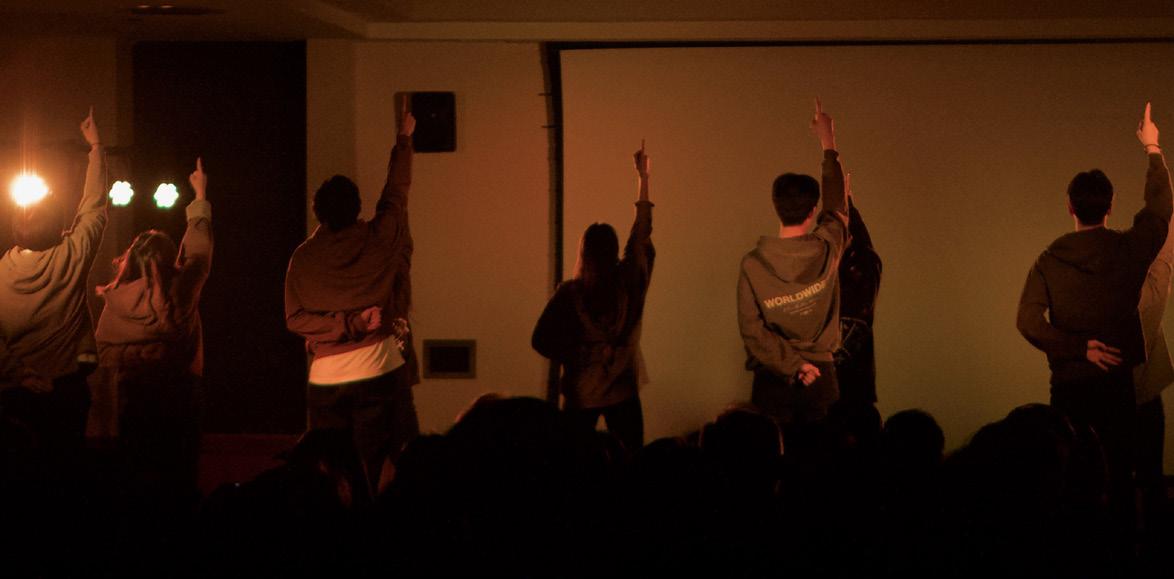
In another group performance, dancers wore coordinating jean jackets and showed off their smooth moves to the slower track “Higher” by Madison Ryann Ward. In one dramatic moment, dancers crouched on the stage and alternated jumping up so that they popped up above the heads of the audience.
During a pause in the night’s dance routines, the group announced the winners of a raffle contest that raised money for the charity El Amor del Señor, an organization that travels to Mexico to conduct missionary work.
After an intermission, one perfor-
mance began with a skit, as two dancers pretended to run into each other at the gym. When one dancer acted out sending a playlist to the other, the music came in with a bass drop and an assembly of dancers performed to a medley of worship songs.
The audience met each routine with a burst of applause, and Cap dancers who were waiting for their cues offstage yelled out words of encouragement to
their peers.
To finish off the night, all of the members gathered for a full group performance—a piece titled “Lost and Found.” Pairs of dancers broke from their opening stances, dancing between the
Read the rest of this story at www.bcheights.com
Student band Photo Negative has made many appearances both on and off Boston College’s campus since the group’s inception in 2018. The band’s second EP, Punting the Sweet Fantastic, is set to come out on streaming platforms on Friday.

The group’s indie-rock sound comes through in the electric guitar’s sultry melodies and the entrancing drum patterns. Vocalists Matthew Hogan, CSOM ’22, and Benjamin Crandall, CSOM ’23, paint pictures with the EP’s bright and playful lyrics. The band also includes bassist Nicholas Straub, MCAS ’23, saxophonist Stephen Ventura, CSOM
’22, and drummer Éamon Laughlin, MCAS ’22.
The band members started producing Punting the Sweet Fantastic at the beginning of the fall 2021 semester.
They pulled together songs that they occasionally play at shows but had never released on streaming platforms. The EP features three songs: “Good Reason,” “Punting the Sweet Fantastic,” and “Quicksilver.”
Hogan said that he wrote “Quicksilver” two years ago, and, after the band workshopped the piece together, the band played it at its first show, hosted by the BC Music Guild. “Quicksilver” showcases Ventura’s saxophone skills throughout the track, commanding attention between verses. The lyrics contemplate how time can feel like it’s moving too quickly and life’s inherent unpredictability.
“I wanna run until I’m almost out of time / [Time] is erased / I’m feeling debased,” Hogan sings.
Photo Negative said that its new EP’s lyrics do not follow any theme or singular meaning. Instead, the lyrics
reflect on how the members were feeling when they wrote the songs.
“I don’t know if it was conscious or subconscious, … but I get the sense of clinging to good moments—life kind of flying by,” Straub said.
Hogan, Laughlin, and Straub agreed that the title track, “Punting the Sweet Fantastic,” is their favorite song from the EP. Its energetic and carefree tune makes it the most fun to play live at gigs, according to Hogan.
Photo Negative played the track “Punting the Sweet Fantastic” in December at Paradise Rock Club when the band opened for rock band Juice.
“I don’t wanna be another domino / If we’re gonna fall / But I’ll punt the sweet fantastic / If that’s what it takes / To truly break away,” Crandall sings.
A key moment in the creation of the Punting the Sweet Fantastic EP was recording “Good Reason” within the span of one day, according to Hogan. The band only needed a couple of takes to record the drums and Crandall’s vocals, Hogan said.
For previous projects, Laughlin recorded the drum part separately
from the vocals and guitar. But this time, Laughlin decided to record with two other members playing guitar alongside him. Laughlin said that the results of this recording session shine through in the upbeat energy and rhythms that he plays on “Good Reason.”
Photo Negative completed its EP in mid-March, just after coming back from Spring Break. In April, the band competed in BC’s Battle of the Bands, making it to the final round with two other student bands. The final round, known as the BC’s Best competition, will take place during Arts Fest, from April 28 to 30.
The band’s plans for the future remain unclear. Three of the five band members will graduate this spring, but the band members are optimistic about staying together.
“Especially given how far we've come in just the last four or five months, we all kind of agreed we want to try and keep it going while we can,” Hogan said. “Because I think we got something really cool going here. So if it makes sense, then why not?”
Living in a world full of magic and mythical creatures may seem like a dream to some, but with all the whimsy comes an abundance of dark magic. Along with every phoenix and griffin, there’s a person attempting to take advantage of the animals’ good hearts and powers.
In Fantastic Beasts: The Secrets of Dumbledore, the screenwriters take magical realism to a new level. In the previous movie in the series, Gellert Grindelwald is sentenced to life in prison. But in this latest edition, the fact that Grindelwald is freed with no restrictions at the beginning of the movie is a cop-out for the writers, who needed a way to keep the story moving.
Despite lackluster storytelling tricks, this third installment of the Fantastic Beasts series, an extension of the world of Harry Potter, offers all the magical elements. With spells, potions, and elaborate CGI backgrounds it includes everything you would expect from a movie about wizards.
The movie reveals how Albus Dumbledore (Jude Law) and Grindelwald (Mads Mikkelsen) used to be a team until Grindelwald turned to the dark side and desired to initiate a war between muggles and wizards. The evil wizard plots to become the leader of the Ministry of Magic, and Dumbledore must challenge him.
Because Dumbledore and Grindelwald are bound by a blood pact, they cannot directly duel each other. Instead,
Dumbledore enlists help from magizoologist Newt Scamander (Eddie Redmayne) and his crew to defeat Grindelwald.


This film features more imaginative animals than in past Harry Potter movies, including an Augurey, a bird that turns into a hot air balloon in order to fly people around. The classical music that accompanies each scene contributes to the whimsy and surrealism of each magical scene.
Fantastic Beasts, in addition to the classic magical elements from the world of Harry Potter, intertwines romantic plots throughout the movie to further captivate the audience. The most compelling relationship is an LGBTQ+ romance in the storyline between Dumbledore and Grindelwald, something that is new for movies in the wizarding world.
 By charley coNroy Heights Staff
By charley coNroy Heights Staff
Weezer has fallen a long way since its peak in the ’90s.
The rock band released the first of its four forthcoming EPs, one for each season, with SZNZ: Spring on March 20. Following its most recent album Van Weezer, which came out in 2021, the band is diving into more gimmicky music. Any charm that Weezer once had is completely missing on SZNZ: Spring

The most notable issue with SZNZ: Spring is Rivers Cuomo’s voice. His tone gets more grating as the album goes on. The songs’ lyrics are simplistic, and, although Cuomo has almost 30 years of songwriting under his belt, this
latest project does not show that he has developed as a songwriter.
The lyrics of “Wild At Heart” convey nothing about his relationship with a romantic interest and are merely an attempt at a catchy chorus.
“Wild at heart / You got me wild at heart / Like we used to be / And like we’re meant to be,” Cuomo sings.
There is no subtlety or even a singular clever line on any of the tracks—only repetition of the most bizarre lines that a mind could muster. Repeating “Shakespeare makes me happy” and then naming Shakespeare plays is not an impressive way to write a song about a theater date with a loved one, which is what Weezer does on “Opening Night.”
Every track’s meaning can be boiled
down to its title. “All This Love” is about Cuomo having an abundance of love to offer. You might have a better time just reading the titles of the tracks than listening to them.
Whenever Cuomo is not singing, the album becomes easier to digest. Musically, the record includes interesting changeups in sound even though they rarely extend past the songs’ intros. The introduction to “Angels on Vacation” incorporates an organ. It’s painfully on the nose for a track about angels to include churchly instrumentals, but the instrument’s sound is an interesting addition.
But the moments of instrumental experimentation aren’t blended into the typical Weezer sound. Instead, they make for an awkward introduction that
shifts into the same Weezer pop rock that the band has produced its entire career. That pop-rock sound can be catchy, but a band that has been alive for this long
Read the rest of this story at www.bcheights.com



Following your heart despite the opinions of your loved ones takes great strength—something that Mark Wahlberg recognized when he decided to bring the story of Stuart Long, better known as Stu, to the big screen in Father Stu


Father Stu tells the story of Long, a boxer turned actor turned baptized Catholic turned priest. He devoted himself to each profession with everything he had, even when everyone told him he wouldn’t succeed. He faced significant setbacks, including injuries and illnesses, but he always found a way through and did not lose hope.
“Stu’s challenging you to be a little bit
better,” Wahlberg said at the premiere of Father Stu in Boston. “You’ll see that when you see the movie. He’d want you to do a little bit more and to be a little bit better.”
While the storyline is both compelling and heartwarming, the movie frequently jumps around, creating a choppy plot that can be hard to follow. The film tried to pack every relevant detail of Long’s life into a two hour–long movie. Watching Father Stu felt like riding a roller coaster, but instead of emotional ups and downs, it delivered an overwhelming rush of information and details.
The movie successfully highlights the cultural era of the ’80s, featuring popular fashion of the period. While there are no jarring mullets, huge perms, or neon clothes, Stu (Wahlberg) has a dated ward-




robe that include distressed jeans and old, white tank tops.
The soundtrack is also oldschool, including “9 to 5” by Dolly Parton as another subtle indication of the time period. The music demonstrated Stu’s country roots as well, playing more country music than pop or classic rock, two genres that were popular in the ’80s.
The two big names in the movie— Wahlberg and Mel Gibson, who plays Stu’s father—do not have as much screen time as a viewer might think considering their fame and acting chops. Wahlberg is the star of the film, but Gibson only trickle into the movie at points, more at the end than any other time.
Gibson’s main purpose is to drive home the point that Stu’s father was ab-
sent from his life. Almost every scene the actors appeared in together involve yelling and heavy amounts of swearing. And like most movies that involve boxers, there’s
Read the rest of this story at www.bcheights.com
The iEdit column is a tradition of past boards of The Heights. In each column, a Heights editor curates a playlist that captures his or her music taste.




Another board member analyzes the song choices, psychoanalyzing the playlist creator in the process. There’s been a brief pause in the series since 2020, but we are kicking off the column series once again. Lauren Wittenmyer, managing editor, is here to pick apart the song selections of Megan Kelly, president and editor-in-chief.
Prior to receiving Megan’s playlist, I would have bet my life that three artists would make an appearance: Taylor Swift, Bon Iver, and Phoebe Bridgers. Much to my surprise, I was only right about two of the three. Granted, Swift and Bon Iver’s contributions make up nearly half of the playlist, so I feel as if I didn’t miss the mark by too much.

Although I truly believe a playlist can never have too much Swift—I consider myself an ardent fan of both of Megan’s selections of hers—I have to say the juxtaposition between “Cruel Summer” and “ivy” was an interesting choice. The indie-pop sound of “ivy” follows the live-
ly synth-pop style of “Cruel Summer” just six songs later. These are certainly two Swift songs I wouldn’t have thought to pair with one another, but somehow, it seems to work.
I have to admit I was expecting a far more despairing and melancholic experience—keep in mind this is the girl who thinks “Kyoto” is a “hype song.” But I was pleasantly surprised when the playlist opened with the Libertines and proceeded to close with Sam Fender. Even Miley Cyrus’ rendition of “You’re Gonna Make Me Lonesome When You Go” is a light and airy addition. Although a part of me wonders if Megan only included
Read the rest of this story at www.bcheights.com
being outside evoke a sense of attachment to the outdoors. This sensation of feeling more alive in nature is actually named. It’s called biophilia and theorizes that humans have an intrinsic desire to connect with and be in nature. So perhaps connecting with our original purpose as a human is contributing to my obsession with the fruit-andsun combo.
us to have a more complete relationship with the food that we are eating. We can feel the texture of the food and fully smell and taste it, giving us a multi-sensorial experience unlike when we eat our food inside.
There is something so ethereal about eating fruit in the sun. Strawberries specifically, in my opinion, but it doesn’t really matter which fruit. I have the biggest—and I cannot emphasize this enough—soft spot for eating fruit in the sun.
It recharges my soul. I feel whole, filled with love and warmth—not too far from the feeling of hugging someone you love after not having seen them for a while.
Perhaps some of the joy I derive from eating fruit in the sun is because of our species’ relationship with eating outside. For most of our time on this earth, we ate our food—that we gathered ourselves—outdoors. From an evolutionary perspective, our bodies relax and are able to focus in nature.
This connection extends to a time even more recent than the Stone Age—early in our own timelines. There is a certain nostalgia, at least in my experience, associated with eating outside. Eating outside is usually associated with some celebration or other special event, and we would therefore eat with a certain level of excitement at these events. In my family, eating outside reminds me of summer barbecues at my grandparents house, romping around in the woods and then coming back to eat hamburgers. At all of my birthday parties growing up, my parents would entertain the family on our deck. These memories are invaluable to me and definitely contribute to my perception of food outside, even though I mostly ate cheese-doodles at these events.
These evolutionary and personal memories of
I didn’t think that this was the only answer though. And I was correct.
Psychologists have looked into this phenomenon—not my specific love for eating fruit in the sun, but more broadly on the topic of how our environment can affect our senses and mood. Positive moods are associated with positive environments like nature and natural light. So, when we’re in a good mood, the general conclusion is that the food itself tastes better outside. This could possibly be explained by the connection between taste and smell. With the exception of allergies, fresh air reduces congestion and therefore enables us to taste more acutely because of an unimpeded sense of smell. Our improved smelling abilities outdoors become very important when you consider how we taste things. How something tastes isn’t solely defined by sensations on our tongues—its smell and textures also contribute greatly to how we think it tastes. Indoor air does not allow for the same effect, as it is typically stale with higher levels of humidity.
The fresh air also has an effect on your brain, which affects the way you process taste and all of its associated components. Outdoor air lowers your stress hormones and blood pressure, which allows you to focus fully on the taste of the food and enjoy it more than if you were inside.
Further, nature allows for us to fully slow down at the same time that it engages all of our senses. With all of our senses being put to use, we are able to eat mindfully and take our time to process what we are eating, rather than rushing through the meal to get to our next task. This allows for

The benefits of being outside in general likely also contribute to the better tasting food. When you are outside, vitamin D levels boost, anxiety decreases, and most people report an increase in happiness as well.
Notably, these effects continue to enhance health even after the meal is complete. Eating outside exposes you to more sunlight, which helps to regulate our ever-important circadian rhythm, which favors eating during the day and not the night. Being more in tune with these internal clocks improves sleep as it is responsible for the production of melatonin, also known as the sleep hormone. That alone should be enough motivation to at least try to eat a few meals a week outside. This will be increasingly easier as the weather warms, and most students are flocking to the quads or the tables outside Lower.
Unfortunately, despite all of the benefits of eating outside or being outside in general, the Enviornmental Protection Agency still estimates that Americans spend about 90 percent of their time inside. It follows, then, that most people eat their meals inside as well. And often, we eat our meals alone. Eating outside provides a perfect remedy for this, though—what could be better than combining the benefits of socializing with those of eating and being outside?
The only thing that I could even argue would be better is eating fruit in the sun (recall my obsession from the beginning).
All that being said, I sincerely hope you try eating outside. I love it, and would be so happy if you discover that you do too.
Alli Hargrove is an op-ed columnist for The Heights. She can be reached at allison.hargrove@bc.edu.
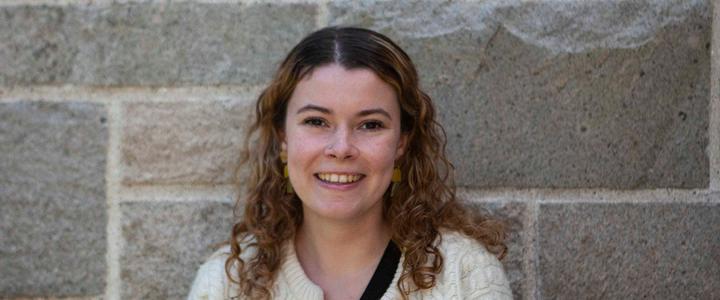
After CAB announced that Dominic Fike was set to perform at Modstock, visions of Euphoria-themed outfits danced in BC’s students’ heads. Fike, known for songs like “Chic bken Tenders” and “3 Nights,” recently gained even more acclaim for his role as Elliot on HBO’s Euphoria. Fike’s concert will be sure to wind down the end of the year successfully as just hype enough to motivate us for finals studying and just chill enough to ring in those summer vibes. Here’s to hoping that if he decides to sing his character’s song from the show, he chooses to play an abridged version.
Smashed berries on the ground around campus signified the arrival of BC Dining’s end-of-year fruit sale. As the weather gets warmer and warmer, students can be spotted laying out on the quads picnicking with strawberries, blueberries, and raspberries galore. Berries make a perfect bite-sized, on-the-go snack to stick in your tote bag while running around campus, are delicious when added to your dorm room oatmeal, and can even be added to your water for some added luxury.



When thinking about what I wanted to write about for my last political column before I graduate, I had no shortage of options—among the war in Ukraine, the proliferation of efforts to restrict the rights of LGBTQ+ youth, and the rising costs of basic necessities, things are looking pretty bleak. With graduation just around the corner, however, there is one policy failure in particular that I am about to become intimately acquainted with: the student loan debt crisis.
At the time I’m writing, student loan borrowers in the United States collectively owe $1.7 trillion, a figure that has skyrocketed 144 percent in the past 15 years. About 45 million people nationwide are affected by student loan debt. Student loan debt, unlike other debt, is nearly impossible to escape from by declaring bankruptcy (made even more difficult by President Biden’s administration’s penchant for fighting against struggling borrowers in bankruptcy proceedings). The weight of these loans can be crushing and can haunt borrowers for decades. Every year, about a million people default on their student loans, and one in 14 have reported suicidal thoughts directly tied to the inescapable burden of their student debt.
To 18-year-olds eager to go to college and set themselves up for success, private loan companies and the federal government have an easy sell— students take on an average of $40,000 in student loans with the promise of the opportunity to leverage their degrees, get a good job, and pay it


back. Lenders prey on lower- and middle-income teenagers, telling them the best way to cling onto the middle class is to take on more debt. In reality, this could not be farther from the truth. Student loan collection companies like Navient create financial precarity, often providing misleading information to borrowers, deliberately tricking them into extending repayment periods, paying more in interest, and concealing ways that payments can be lowered. The student loan racket is a sinkhole, tanking the credit and financial stability of working-class people who just want to get a college education.
Biden has the power to unilaterally forgive up to $50,000 of student loan debt for every borrower under a federal loan. Under the Higher Education Act, the president has the power to issue an executive order for student debt cancellation, and this could be done without having to work with Congress, leaving no possibility for the policy being derailed by one conservative Democratic senator. Canceling $50,000 for each borrower across the board would effectively wipe out 80 percent of student loan debt and would provide much-needed relief.
Forgiving student loan debt would have a massive impact, not only on individuals, but on the economy as a whole. Economists say that canceling student debt would be one of the best ways to prevent a recession without further fueling inflation, since it is unlikely to have an impact on day-to-day spending. Freeing people from crushing debt would ripple positively across the economy as a whole—previously overburdened borrowers would be given some space to breathe, allowing them to buy a home, start a business, have children, and save for retirement. Almost 36 million people would be able to put thousands of extra dollars each year into investing in their own quality of life. Forgiving student debt is a moral imperative.
Beyond being the right thing to do, canceling student loan debt would deliver Biden a much-needed political victory, especially among the younger voters that Democrats need to turn out for the midterms in November. Recent polls show that young voters are rapidly turning on Biden— 50 percent of people under 30 explicitly disapprove of the Biden administration. In 2020, young people turned out for Biden as a reaction against Trump, and Biden has not done enough to motivate this demographic to support him now that Trump is out of office. Two-thirds of Generation Z and 80 percent of millenials support some form of student loan forgiveness. With the Build Back Better bill stalled for the foreseeable future, rising inflation, and low approval ratings, Biden should be searching for an easy political win—student loan debt forgiveness could provide the boost Democrats need.
Opposition to debt cancellation fails to properly weigh the moral and economic benefits that would result. One protest that often comes up is that forgiveness of loans is unfair to people who have already paid, but the fact that people suffered in the past does not seem like a compelling reason to prevent people from suffering in the present and the future. Another common criticism is that blanket forgiveness would extend debt relief to the wealthy. There is substantial evidence that universal programs are better than means-tested programs at improving the material conditions of low-income people. The success of loan forgiveness would be well worth the cost of paying off the debt of the few wealthy people who have it in the first place. For the sake of equity, economic practicality, and political strategy, canceling student loan debt is the clear answer.
Sophie Carter is an op-ed columnist for The Heights. She can be reached at sophia.carter@bc.edu.
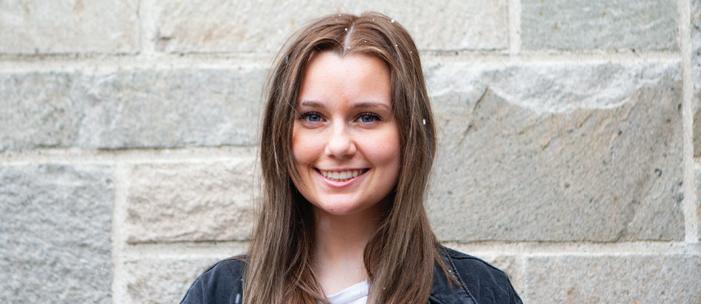
Much can be communicated through the ending of an email. Sincerely, best, regards, best regards, thank you, even love—all email sign-offs—convey something to the recipient of your email. Most people pick their favorite and stick with it, but many times the signature requires a few extra minutes of thought depending on who you’re emailing. You most certainly wouldn’t want to end an email to your professor with “love,” and your mom would probably have your head for ending an email to her with “regards.” And that’s not to even mention how to open your email, because “I hope this email finds you well!” is getting old.
As it comes time for Eagles to return home for the summer, it also comes time to schedule those long overdue dentist appointments and doctor visits. For many though, the worst part of these visits is not the weird scrapy hook that the dentist uses on your teeth or the shot that your parents promised you wouldn’t have to get. No, for many, the worst part happens before the appointment itself: the scheduling phone call. Ever since your mom put the kibosh on scheduling all of your appointments for you in high school, you still haven’t quite adjusted to the probing questions of the receptionist on the other end of the phone at your dentist or doctor’s office. How are you supposed to know if your family is still on the same insurance plan? You don’t even live there anymore!
Boston College administrators and student organizations should be commended for the success of their student programming on Marathon Monday.
The campus-centric activities—which included Breakfast Bingo, Mile 21 Field Day, and a live concert by Jason Derulo in the Mod Lot—refocused Marathon Monday behavior away from overcrowded parties off campus and toward celebrating the runners and Greater Boston community. This sets a strong precedent for future collaboration on events that require compromise from both students and University administrators.
Students typically cross Commonwealth Avenue early in the morning to party at off-campus houses before runners arrive. The University and Boston Police Department received a large number of complaints about student behavior from local residents after the last marathon in October, according to an April 14 email sent to the student body.
“Boston Police is expected to have zero tolerance for disruptive behavior and underage drinking in the neighborhoods,” wrote Tom
Mogan, associate vice president of student engagement and formation, in the email. “It is critical that all students are respectful of our neighbors who live close to campus, as well as their property.”
To address these concerns, administrators consulted student groups and leaders to create on-campus programming that would alleviate the strain of off-campus celebrations. This collaboration is exemplary and should be employed more often to implement well-informed solutions to other issues that directly affect students.



Crowds of students enjoyed lawn activities, food trucks, and raffles on Maloney Lawn throughout the day. Despite arriving on stage more than an hour late, Derulo’s performance had no major technical issues, maintaining the excitement of Marathon Monday while also drawing students away from the off-campus neighborhood.
The efforts of administrators and student groups—including UGBC, the Division of Student Affairs, Campus Activities Board, BC Athletics, Campus Ministry, and BC Recre -

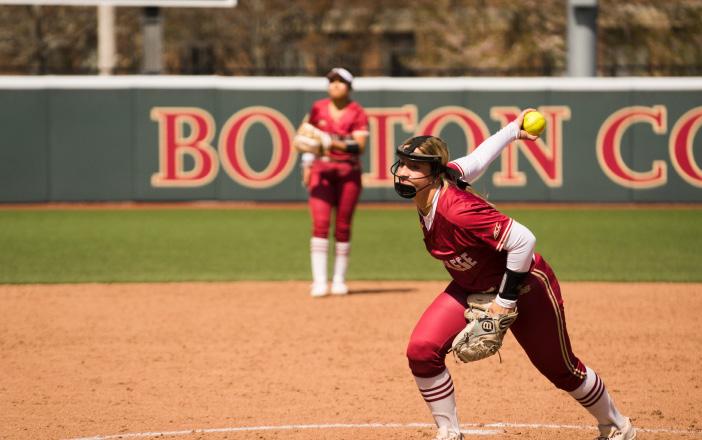
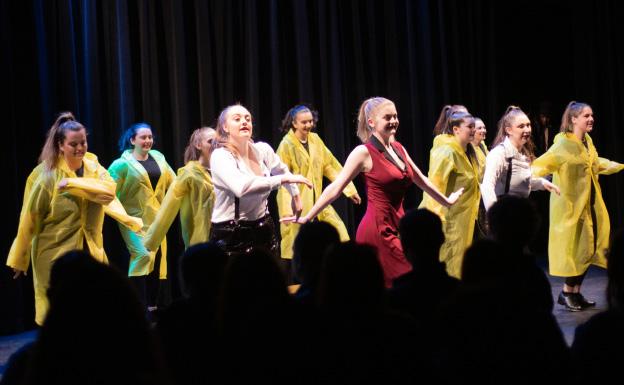


ation—eased the tension between BC and the surrounding community by incentivizing appropriate behavior and crowd control.


These student-led groups strategically used their resources to reinforce a sense of safety and community during Marathon Monday celebrations. It is refreshing to see student leaders effectively bridge the gap between students and administrators by maximizing the potential of their financial resources.
The collaboration of these groups also helped connect the BC community. Administrators cheered on runners—many of whom are members of the BC community—alongside students at Mile 21.
This Marathon Monday was a strong example of the BC community coming together to celebrate a Boston tradition and support marathon runners. Increased communication and collaboration between University administrators and student-led organizations will improve the highly anticipated marathon experience for students and improve BC’s relationship with the Greater Boston community.
For baseball players, arriving early for a game at Fenway Park is requisite. As the oldest ballpark in MLB, its history and idyllic nature make it impossible to miss. Its quirks, asymmetry, and intimate feel are what make it unique. From the tang of a Fenway Frank to the sound of a ricocheted ball recoiling off the Green Monster, Fenway has a breathtaking charm that newer, fancier ballparks can’t compete with.
Despite a 6–1 loss for Boston College baseball (15–24, 3–17 Atlantic Coast) against No. 8 Virginia Tech (27–9, 11–7) in the 10th Annual ALS Awareness Game—which honored the late Pete Frates, BC ’07—Fenway did its magic dance again on Saturday night.
“It never gets old,” BC head coach Mike Gambino said after the game. “Honestly, whether you’re coming as a fan or on a tour, or you’re lucky enough to have the ability to play here, this place is so special. It’s so magical every single time.”
When the “Frate train” chants bellowed from the nearly 4,000 fans in attendance of the game, BC’s dugout came alive, and the momentum shifted in favor of the home team from the first pitch.
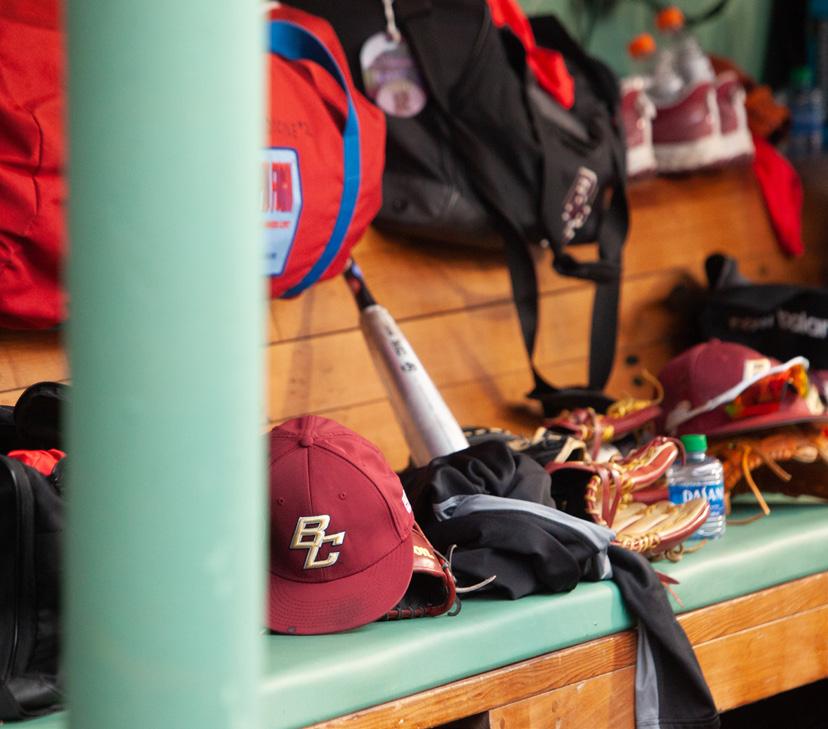
“It’s one of the things we do here at BC,” Gambino said. “We teach kids to leave as men and women for others. Pete was one of our all-time best examples, so to be able to honor him and have a tangible thing for our students and alumni to say ‘This is what you can do if you get a Jesuit education,’ that’s special.”
Hurrahs from the grandstands echoed through Fenway. Frates, who captained BC baseball in 2007, became a driving force behind the viral Ice Bucket Challenge in 2014 after being diagnosed with amyotrophic lateral sclerosis (ALS) at the age of 27. He returned to BC as the director of baseball operations in 2012. Through the Ice Bucket Challenge, he helped raise over $220 million toward
research for a cure for ALS.
In the first inning, the Eagles quickly jumped to a 1–0 start. Leadoff hitter Travis Honeyman—playing through a foot injury—knocked a line drive into center field to get the action underway.
BC faced Virginia Tech pitcher Drue Hackenberg, who emerged as a key piece for the Hokies’ pitching rotation and ranks second in the ACC in ERA. While the true freshman didn’t fall into a rhythm until the third inning, Hackenberg finished the contest with seven strikeouts and one earned run through seven innings.
Cameron Leary was up to bat next, and the power hitter tipped a roller that dribbled out just feet in front of home plate. Virginia Tech catcher Cade Hunter bare-handed the ball to make the out at first with Honeyman on the run to second. Luke Gold popped out next, and the Hokies intentionally walked Joe Vetrano.
With runners on first and second, Parker Landwehr stepped to the plate and the Monster swallowed his roped shot, scoring Honeyman.
Had the affair been played at the Harrington Athletics Village, the outcome of that one run would have played out differently. Landwehr’s wall-ball single would have instead been a three-run ho-


mer over a much shorter left-field fence, but the Green Monster’s height kept the ball inside the park.

“We’re one hit away or one play away,” Gambino said. “This team is so close even with all the injuries so far. I feel bad for this group, but the direction of the future of this program in the next couple of years—there’s a lot to be excited about.”
The Eagles’ one score was all they mustered. The Hokies, however, scored six unanswered runs off the bats of Gavin Cross, Lucas Donlon, and MLB prospect Jack Hurley, who entered the game boasting a 1.300 OPS. Hurley stayed red hot, going 2-for-5 with three RBIs.
With Evan Moore pitching in the ninth inning, the Hokies scored two runs. After Donlon singled through the left side, Nick Biddison chopped a grounder to third baseman Patrick Roche, who scooped the ball and blundered the throw to second base, which would have secured a turn-two double play.
Tanner Schobel and Hurley brought in one run each on a flyout and a single.
“Twelve-hour rule,” Gambino said. “If you’re fired up, stay fired up for 12 hours. If you’re crushed like you feel right now, you got 12 hours, and by tomorrow you’ve got another baseball game to win.” n
By Ethan Ott Assoc. Sports EditorWhen Boston College baseball took the field at Fenway Park on Saturday night for the 10th Annual ALS Awareness Game, it was about more than baseball from the first pitch. Fans showed up in droves for a warm Saturday night at Fenway, and over the course of the evening, BC raised $37,600 for people battling amyotrophic lateral sclerosis (ALS). Here are three takeaways from BC’s 6–1 loss to Virginia Tech.
For most of this season, BC has struggled to control its opponents’ momentum, repeatedly allowing long rallies from opposing offenses to slow the pace of play and keep the defense on the field.
On Saturday, however, the Eagles kept things moving. They took momentary control after scoring the first run of the game in the bottom of the first inning, and pitcher Henry Leake kept the game moving by limiting time between pitches and stopping potential rallies in their tracks.
Both Leake and Virginia Tech’s Drue Hackenberg ensured an upbeat game by forcing 10 groundouts each and striking out a combined 13 batters.
Through seven innings, Leake allowed just seven hits and one walk while striking out six. He averaged just under 14 pitches an inning, and while he allowed three earned runs during his outing, two came on one swing of the bat. Leake’s pitching kept the Eagles competitive through nine innings, and by lasting seven on the mound, he eliminated the need for relievers to eat up the middle innings. The Eagles have struggled with pitching depth this season, but with starters lasting late into the game, pitching depth is no longer a necessity for winning games.
Unfortunately for the Eagles, Hackenberg had an equally productive outing. He also lasted seven innings and limited BC to just six hits and two walks. Though he was slightly less efficient, with about 15 pitches per inning, Hackenberg struck out one more batter than Leake and allowed just one run.
It surpasses the combined total of BC’s last two games, but one run is not usually enough to win games—especially after earning 10 baserunners. The Eagles had runners in scoring position four times on Saturday, but only one run crossed the plate. BC hit some balls right at Virginia Tech fielders, but 11 strikeouts limited its chances for moving runners. It is nearly impossible to score a runner without putting the ball in play, and the Eagles struggled to make contact against the Hokies.
Despite its struggles at the plate, BC was not without scoring opportunities. Three walks and a hit-by-pitch gave the Eagles four free runners, and a throwing error turned a single into a double. BC’s best chance might have come in the bottom of the sixth inning, when Joe Vetrano and Parker Landwehr singled back to back to put runners on first and second with just one out. A base hit could have scored two and tied the game, but instead,

While struggles on the mound are an ongoing struggle for Boston College baseball this season—its pitching staff sits last in the ACC in team ERA—the Eagles’ weekend series against Virginia Tech told a different story. This time, BC’s bats failed to support its pitchers, who held their own on the mound throughout the weekend’s three games.
The offense continued its cold streak on Sunday, as BC (15–25, 3–18 Atlantic Coast) fell to the Hokies 6–4 in the Eagles’ seventh consecutive loss. It marked BC’s third loss to Virginia Tech (28–9, 12–7) in the weekend series.
“Seasons ebb and flow,” BC head coach Mike Gambino said after the game. “And we’re just in one of those [slumps].”
BC starter Eric Schroeder logged a clean opening frame while striking out a pair of batters. The Eagles’ offense put a

runner in scoring position in both of the first two innings but could not capitalize.
Schroeder did not allow a base runner until the third inning, when he issued a leadoff walk to Sam Tackett. A passed ball, wild pitch, and sacrifice fly later, Tackett scored the Hokies’ first run of the game, all without recording a hit. Schroeder escaped the inning without any further damage.
“[Schroeder] mixed his pitches, walked a couple guys, and pitched around them,” Gambino said. “He’s executing pitches when he needed to. I thought he threw the ball great.”
Consecutive singles in the fourth inning created a prime opportunity for BC to match Virginia Tech’s run. With Parker Landwehr at the plate, the Eagles put their first run on the board after a botched double play attempt scored Luke Gold. Though Landwehr remained on second base, BC left him stranded—one of five runners the Eagles left on base throughout the game.

After John West sat down the first two batters he saw in the fifth inning,
Nick Biddison notched a two-out single, and West walked the next batter. Tanner Schobel took advantage of the two-on, two-out situation with a deep double down the left-field line that plated two.
The Eagles responded again in the bottom of the inning with a Travis Honeyman RBI single. With its second run of the game, BC had already eclipsed its combined run total from the series’ previous two games.
A walk later, Joe Vetrano stepped up to the plate with the bases loaded. Swinging at the first pitch he saw, Vetrano grounded into a double play. After a review, however, the umpires ruled Vetrano safe at first base, scoring Cameron Leary and tying the game up at three runs apiece.
Pitching controlled the following innings until Virginia Tech’s Christian Martin opened the seventh inning with a single. Despite recording two straight outs, a walk and a passed ball set up a second-and-third scenario. With the game on the line, Gambino turned to right-hander Sean Hard.
But Hard loaded the bases after walking Jack Hurley, sending Virginia Tech slugger Cade Hunter to the plate. Hunter smashed a pitch into deep right field off the base of the wall, clearing the bases and effectively ending the Eagles’ hopes of avoiding a series sweep.
“We like [Hard] as a better matchup, stuff-wise, in that scenario,” Gambino said. “Especially his off-speed stuff. … He actually executed a pretty good pitch. He just leaked it over the middle a touch.”
BC added another run via a Landwehr solo home run but failed to complete a comeback.
Aside from its seventh-inning troubles, the Eagles’ pitching staff turned in another consistent performance—a sign of progress, according to Gambino.
“I’m really proud of the staff and what [pitching coach Kevin Vance] has been doing—continue to get these guys better and develop them,” Gambino said. “Because you’ve seen huge, huge improvements.” n
The second quarter ended with the Eagles ahead. Belle Smith scored her third goal of the game with three seconds left on the clock to put the Eagles ahead 7–6, marking the first hat trick from a player on either team.
“I think it was maybe late in the second half when we started really hitting the transition goals and creating some momentum for us, which was exciting, and I think it built the confidence of the girls,” Walker-Weinstein said.
Smith led the Eagles’ offense with five goals, tied for her season high. Her other five-goal outing came in BC’s 19–12 victory over Pittsburgh. Kayla Martello ended the game with a hat trick, scoring twice in the first quarter and once in the third. North added three goals and three assists to pass the 400 career points, becoming just the seventh player in NCAA history to do so.
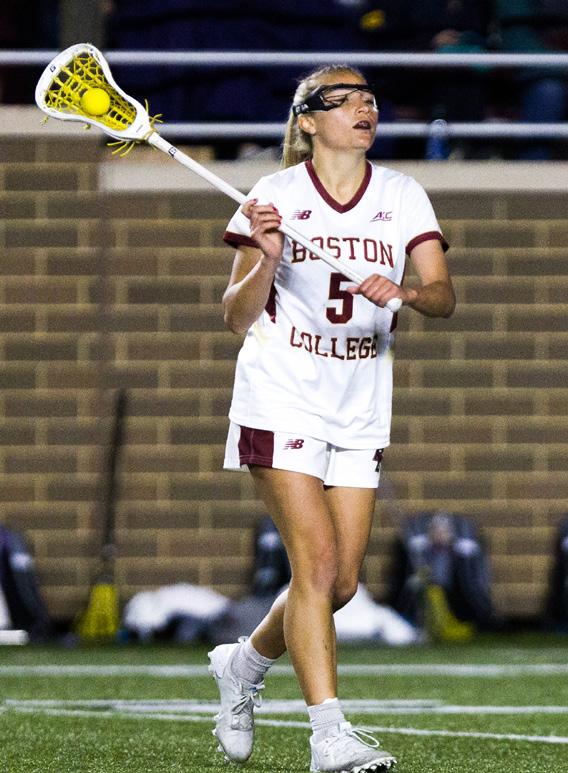

After outscoring Syracuse 5–3 in the third quarter, the Eagles entered the final quarter up by four goals.
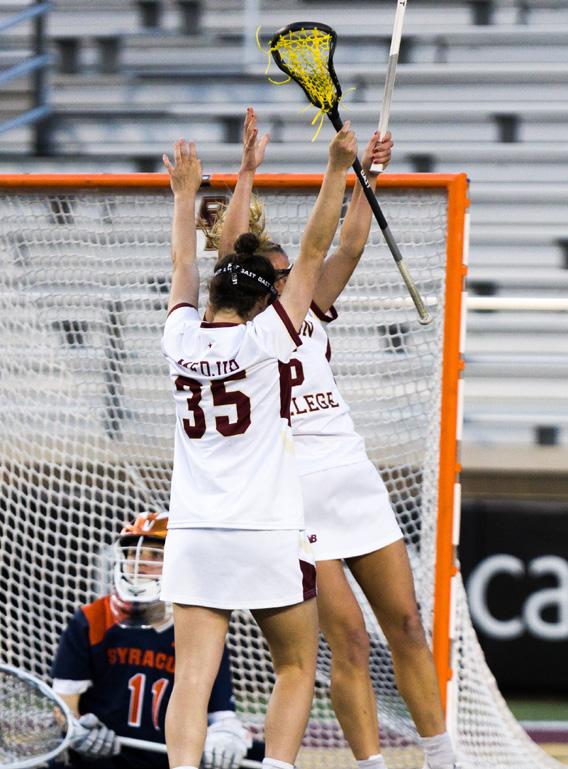

Smith scored 35 seconds into the quarter, giving the Eagles a five-goal lead, their largest of the game.
Syracuse, however, scored four quick goals in the middle of the quarter, and the Eagles’ 13–8 lead quickly became a one-point lead. But the defending national champions continued to do what they had been doing all game—playing strong defense and executing at necessary moments—until the final buzzer rang, and the Eagles came out on top.
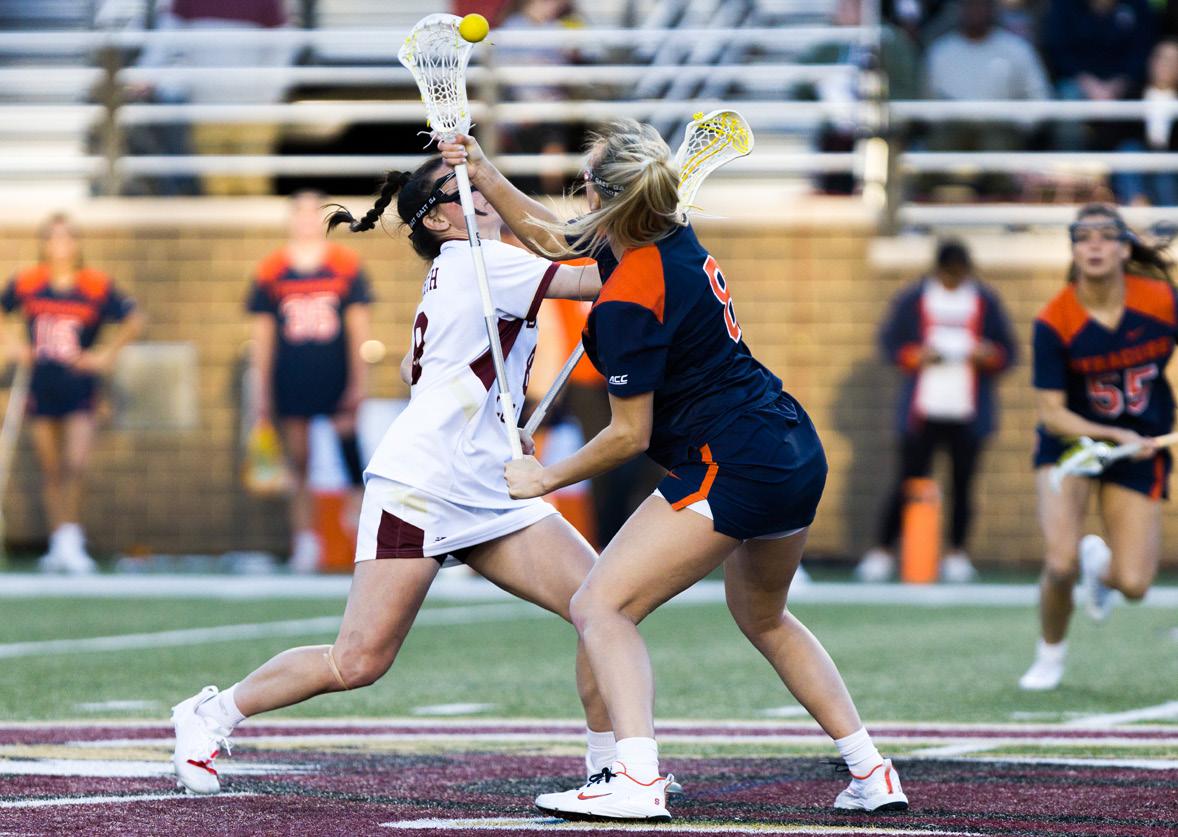
“I’d say all of the sparks came from the defensive end, and the offense did a nice job of having their back by scoring,” Walker-Weinstein said.
The win over Syracuse was the Eagles’ last game ahead of the ACC Tournament next weekend. With the recent win, the Eagles move up in the ACC standings to earn a better seed. After the recent win over Syracuse, BC is third in the ACC behind undefeated North Carolina and Duke. The Eagles finish the regular season with just two losses, both within the ACC to North Carolina and Duke. Walker-Weinstein said she is confident in her team ahead of the postseason.
“I think that was one of the closest games to 60 minutes of focus that we’ve had all year, so that’s right where we want to be,” she said. n